Review of the Seagate Firecuda 530 PCIe Gen 4 NVMe SSD
Few brands in the world of storage media have been smashing the first’ milestones as much as Seagate has in the last few years. Off the back of a hot run of hard drive news promising 20TB drives shortly and 50TB drives inside 4 years, we now have their new PCIe 4 M.2 NVMe SSD to look at. Now, the Firecuda 530 is NOT the first PCIe4 NVMe SSD to arrive on the market, not even close. Seagate has brought their 7,000MB/s contender out 2/3 of a year after rivals at WD and Samsung brought their respective SN850 and 980 Pro AND at a higher price point. At this point, is their new drive a little late to the party or were they just having a good long run-up? Well, the specifications do set it apart from the majority of other drives in a number of very distinct areas and with Seagate placing a heavy focus on sustained write, durability and longevity of their media, this a definitely much more considered approach from the brand and a far leap from the brand that only a few years ago was learning more into competitive pricing and getting there ‘first’. So, let’s take a close look at the Seagate Firecuda 530 in today’s review, see if it’s advantages are clear from day one or are you paying more for eventual gains? Let’s find out.
Note – This review features the 500GB Firecuda 530 ZP500GM30013. This should be taken into consideration during the drive testing portion of the review, as the performance of this series scales in line with the available capacities
Seagate Firecuda 530 SSD Review – Quick Conclusion
For the most part, I DO think Seagate has succeeded in fulfilling the promises they have made on the Firecuda 530 and have arguably released the best example of m.2 PCIe4 NVMe SSD architecture you can buy in 2021. There is no avoiding the fact that the Seagate Firecuda 530 series of SSDs have arrived on the market noticeably later than their biggest rivals AND with a higher price tag, so they were going to need to make a pretty good early impression to make up the ground amply covered by their competitors. The decision to focus heavily on endurance and durability is a remarkably mature one (and potentially controversial one against their competitors) in an age when consumers are demanding prices come down, forcing brands to either cut covers where they think they will be felt the least or going the budget router of QC NAND. Therefore you have to respect Seagate’s decision to draw a line in the sand here about what they consider a high-end SSD.
Seagate Firecuda 530 SSD Review – Packaging
The Firecuda 530 arrives in a remarkably similar box to the Firecuda 520 and despite the obvious change in animal logo, it’s still going to be pretty easy to overlook what massively different drives these are in their architecture if seen on a shelf!
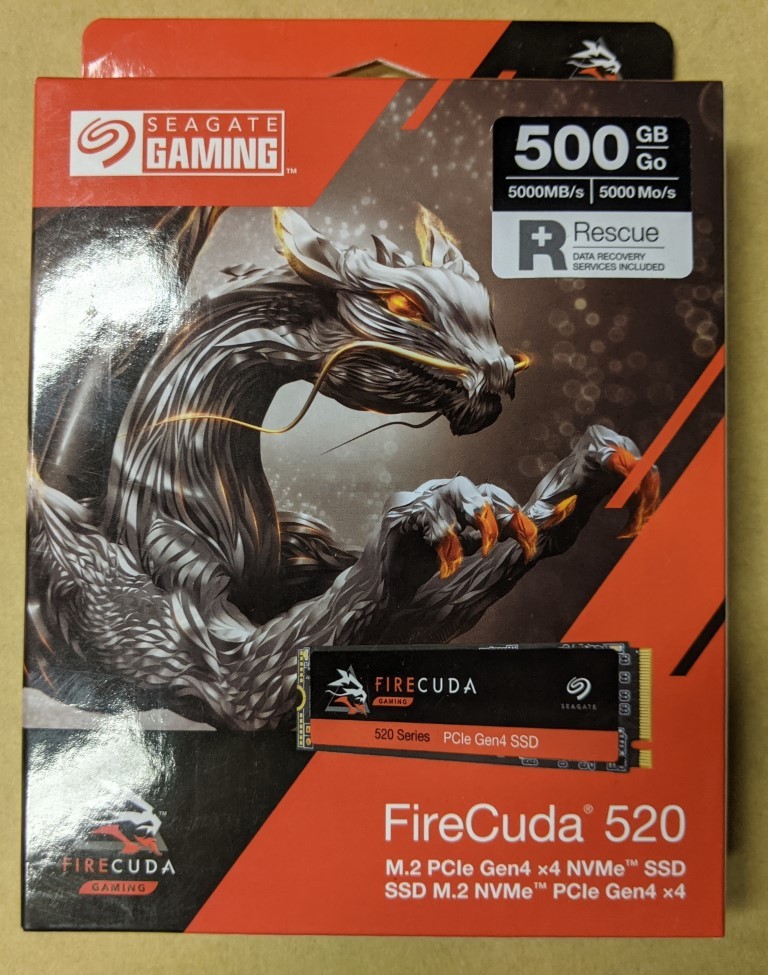 |
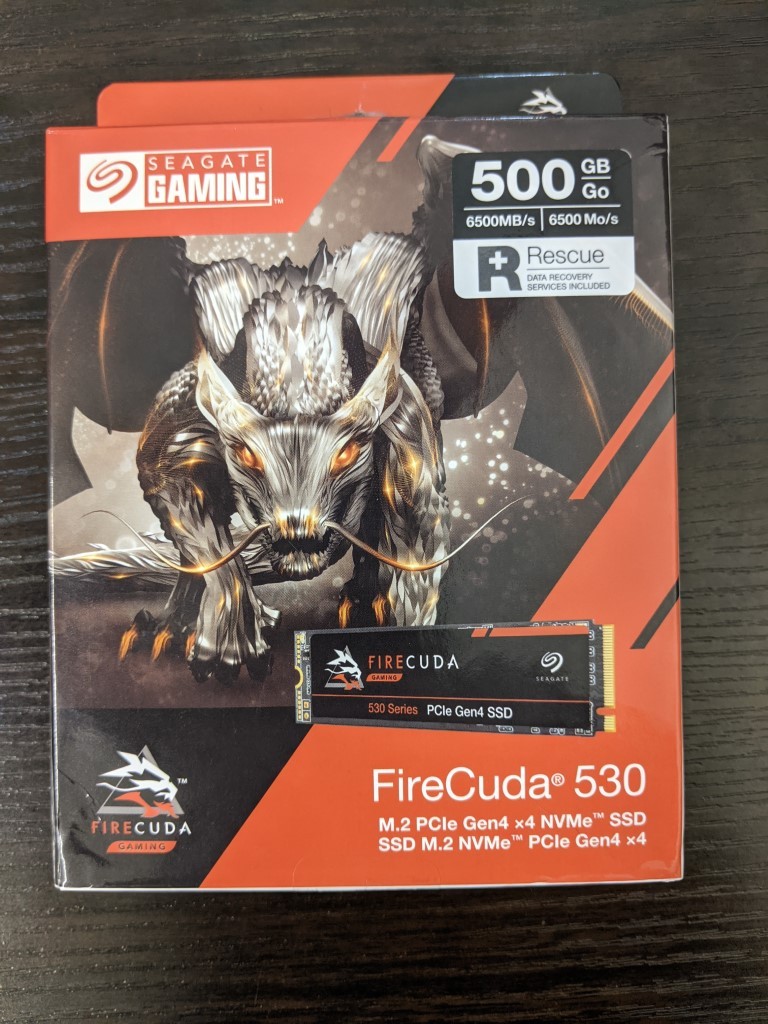 |
Though clearly, this new drive commands a higher price tag and even a quick scan of the promised performance mentioned on the retail box is sets it up to have to live up to a high standard later in testing
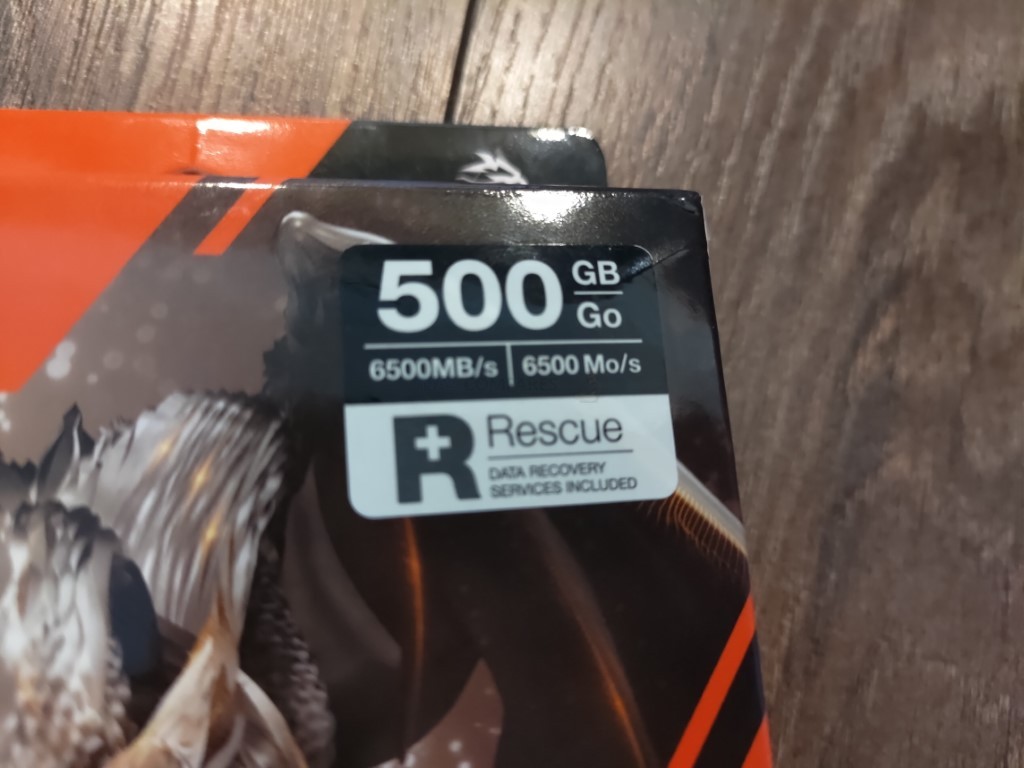
Inside we find the Firecuda 530 SSD in a two-piece plastic shell, thermal pad, warranty information (5 Years + 3yrs Rescue Data Recovery Services) and the Firecuda 530 M.2 NVMe SSD itself in antistatic packaging. All fairly standard stuff and although there is a first party Firecuda heatsink available, this is an optional extra.

Much like previous generations, the Firecuda arrives with a paper label either side of the PCB (so not the metal plate featured on more affordable SSDs like the Sabrent Rocket 4 Plus), but if Seagate’s defence, this drive will be working noticeably hot regardless (due to the significantly higher performance maximum over other drives) and it is highly recommended for use with a proper heatsink regardless – so a metal label would be like putting a plaster on a shotgun wound!

The drive is fairly standard in height to other m.2 NVMes, however, it is easy to forget that the micron NAND featured in the Firecuda 530 is significantly higher quality than many at 176L (something we will touch on later).
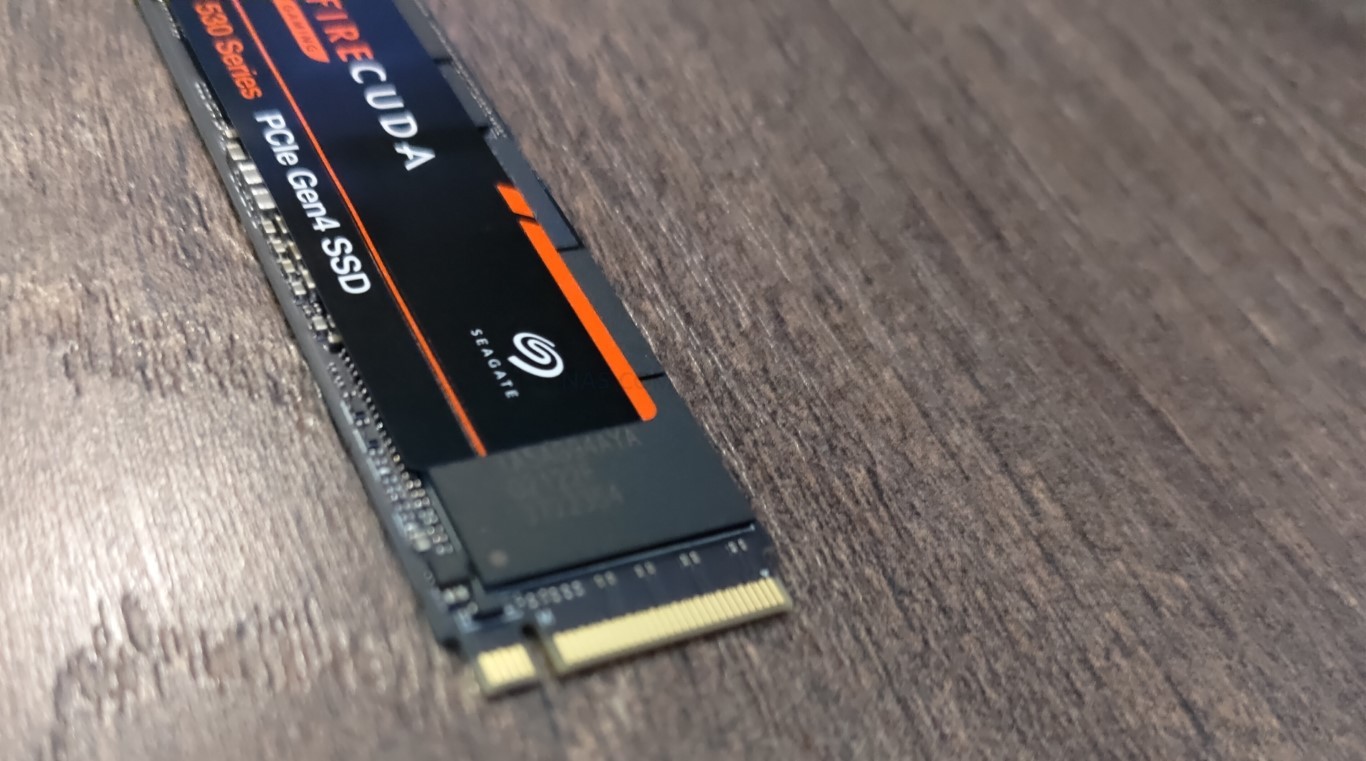
The larger capacity Firecuda 530s drives at 2TB and 4TB feature double-sided NAND placement, resulting in both better capacity handling, performance and durability. However, this needs to be balanced against a larger heatsink/thermal pad application. In PC use, this is of little-to-no concern, but now the Firecuda 530 NVMe SSD is pretty much the ‘score-to-beat’ on PS5 SSD upgrades, this is an important consideration.
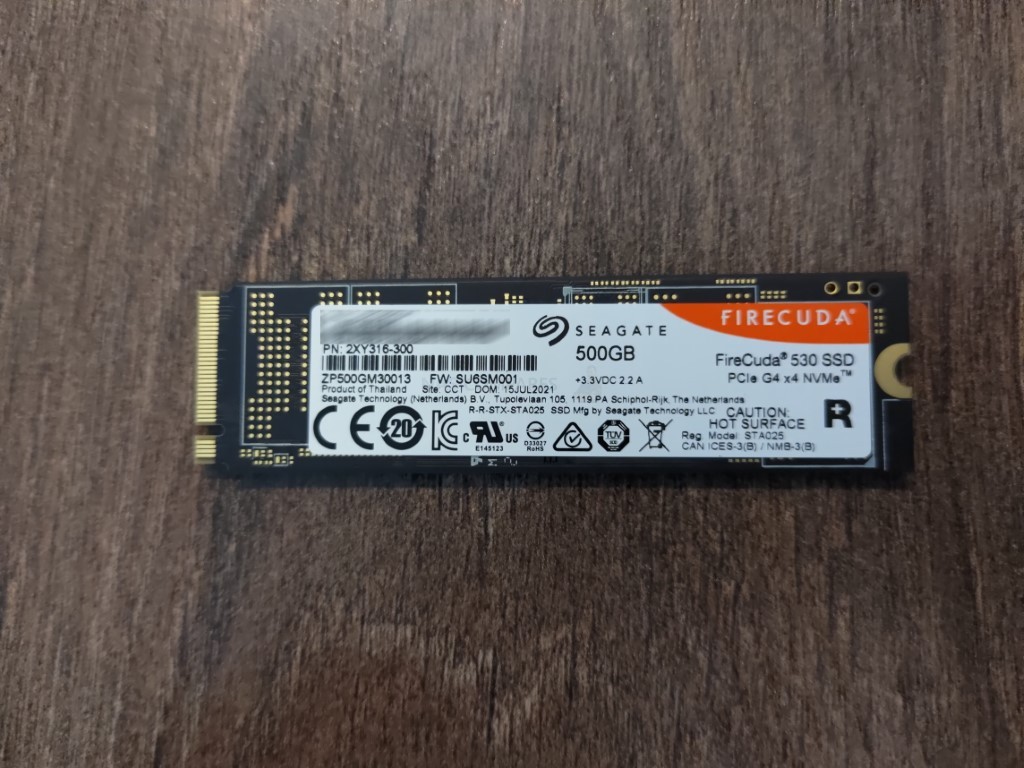
In terms of physical design, you cannot really fault this drive and it is not really going to be apparent until we properly dig deep into the specifications and their stand out qualities where we will see where the extra $ on this drive’s price tag are going.
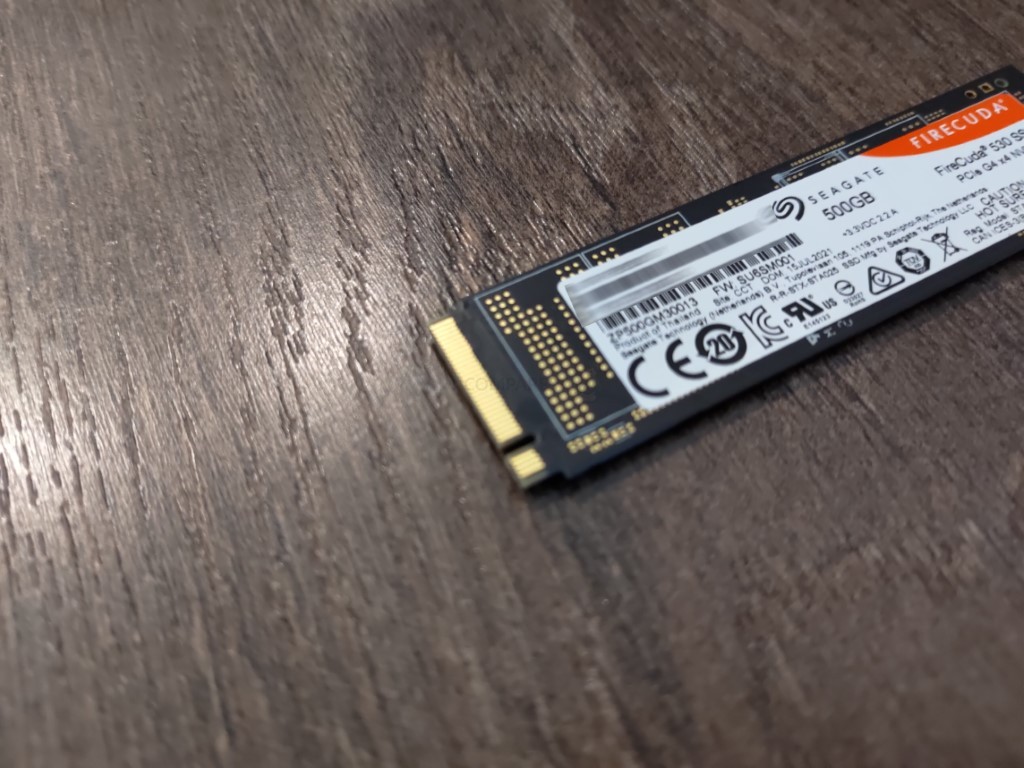
Seagate Firecuda 530 SSD Review – Hardware Specifications
Below is a breakdown of the hardware specifications of the Firecuda 530. There are a number of key factors here that really need your attention!
| Drive | Firecuda 530 500GB
|
Firecuda 530 1000GB
|
Firecuda 530 2000GB
|
Firecuda 530 4000GB
|
| Price | 500GB – $149.99 | 1TB – $239.99 | 2TB – $489.99 | 4TB – $949.99 |
| Warranty, Limited (years) | 5+3yr Rescue | 5+3yr Rescue | 5+3yr Rescue | 5+3yr Rescue |
| PCIe Gen M.2 | PCIe Gen 4×4 | PCIe Gen 4×4 | PCIe Gen 4×4 | PCIe Gen 4×4 |
| NVMe Rev | NVMe 1.4 | NVMe 1.4 | NVMe 1.4 | NVMe 1.4 |
| NAND Type | 176L 3D NAND | 176L 3D NAND | 176L 3D NAND | 176L 3D NAND |
| Controller | E18-PS018 | E18-PS018 | E18-PS018 | E18-PS018 |
| Performance | ZP500GM3A013 | ZP1000GM3A013 | ZP2000GM3A013 | ZP4000GM3A013 |
| Sequential Read (Max, MB/s), 128 KB | 7000MB | 7300MB | 7300MB | 7300MB |
| Sequential Write (Max, MB/s), 128 KB | 3000MB | 6000MB | 6900MB | 6900MB |
| IOPS | ZP500GM3A013 | ZP1000GM3A013 | ZP2000GM3A013 | ZP4000GM3A013 |
| Random Read (Max, IOPS), 4 KB QD32 | 400,000 | 800,000 | 1,000,000 | 1,000,000 |
| Random Write (Max, IOPS), 4 KB QD32 | 700,000 | 1,000,000 | 1,000,000 | 1,000,000 |
| DWPD | 0.7 | 0.7 | 0.7 | 0.7 |
| MTBF, hours | 1,800,000 | 1,800,000 | 1,800,000 | 1,800,000 |
Now, the above is clearly a little more technical than many gamers would like. Obviously, the general performance of the Seagate Firecuda 530 SSD is going to be high (as detailed in the performance tests later in the review), however, its sequential Read performance is actually not too far ahead of the likes of the Samsung 980 Pro and WD Black SN850 released some 5-6 months ago, so why should gamers spend more on this drive? Well, a lot of the more technical aspects that focus on SUSTAINED performance and DURABILITY make up a lot of this. Likewise, this architecture and its impact on Sequential WRITE is also something to consider. Write activity in console/pc gaming of a noticeably smaller fraction of activity over Read, approx 85% Read and 15% Write over time. However this is changing all the time, as games are being regularly streamed or shared, as well as world creation games and create-your-own-adventure sandbox titles growing quite significantly, smaller but sustained write activity running parallel with read is an important consideration. Let’s take a closer look at those key specifications and translate them into normal speak!
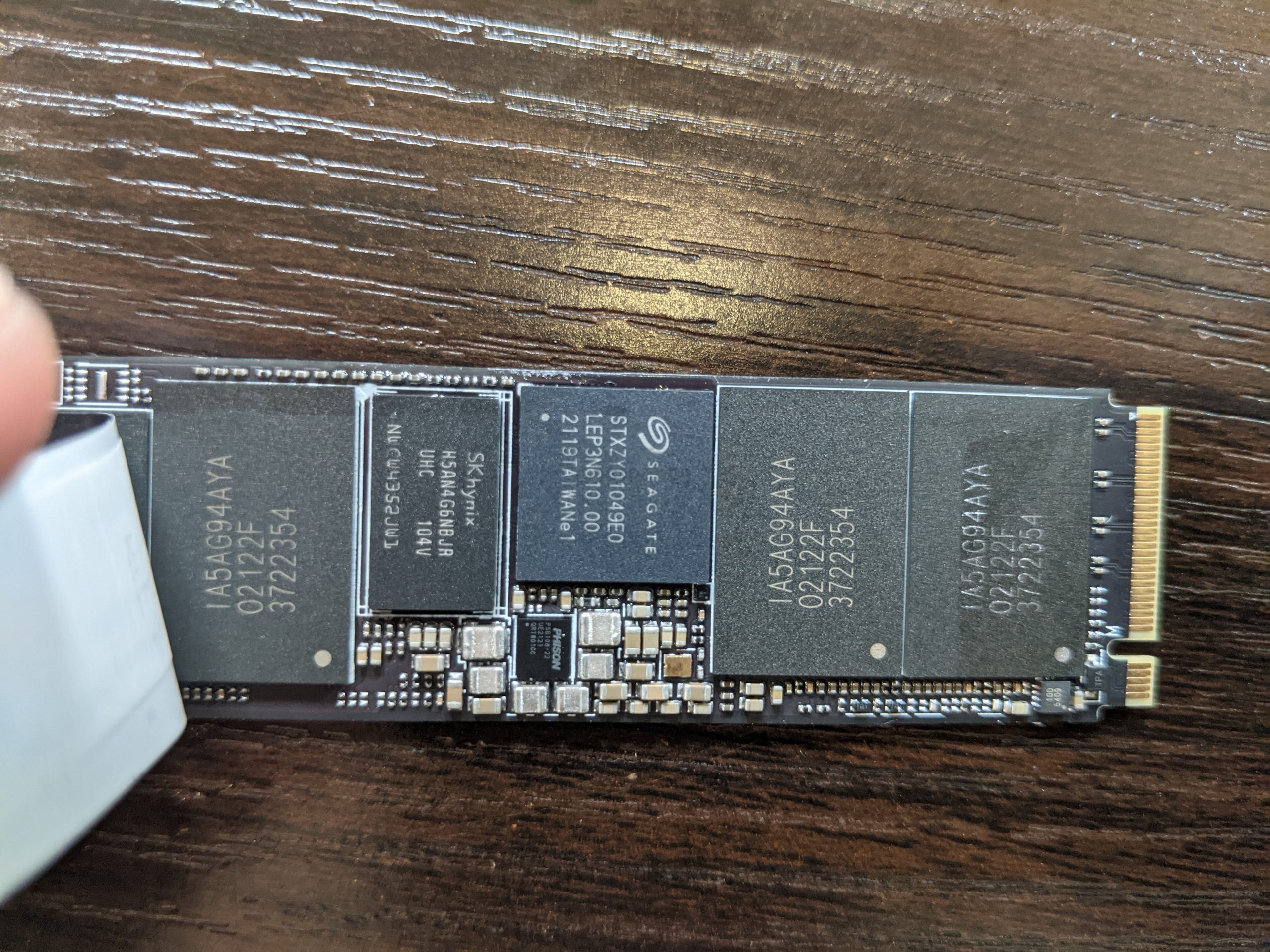
Hardware Focus of the Seagate Firecuda 530 SSD Series
The first big thing to focus on with the Seagate Firecuda 530 SSD is the controller. This is the brains of the SSD and in the case of this SSD, it’s a good one! The Phison E18 has already featured on a few other SSD releases in early 2021 to wide praise and given Seagate’s history of using their controllers right up to the E16 in the previous drive in this series, it was always going to be their SSD controller of choice here. This controller has some remarkably high bandwidth capabilities that the rest of the SSD can stretch it’s muscles a bit in order to try and saturate! Supporting up to a maximum 7,400MB/s and 7,100MB/s sequential Read/Write and up to 1Million 4K Read/Write IOPS, the Phison Controller is pushed quite far to it’s limits at the 4TB Firecuda 530 model. It’s a shame that Seagate does not have it’s own in house teams as WD/Samsung do, but the Phison E18 is still an industry leader right now and an inevitable choice by the brand.
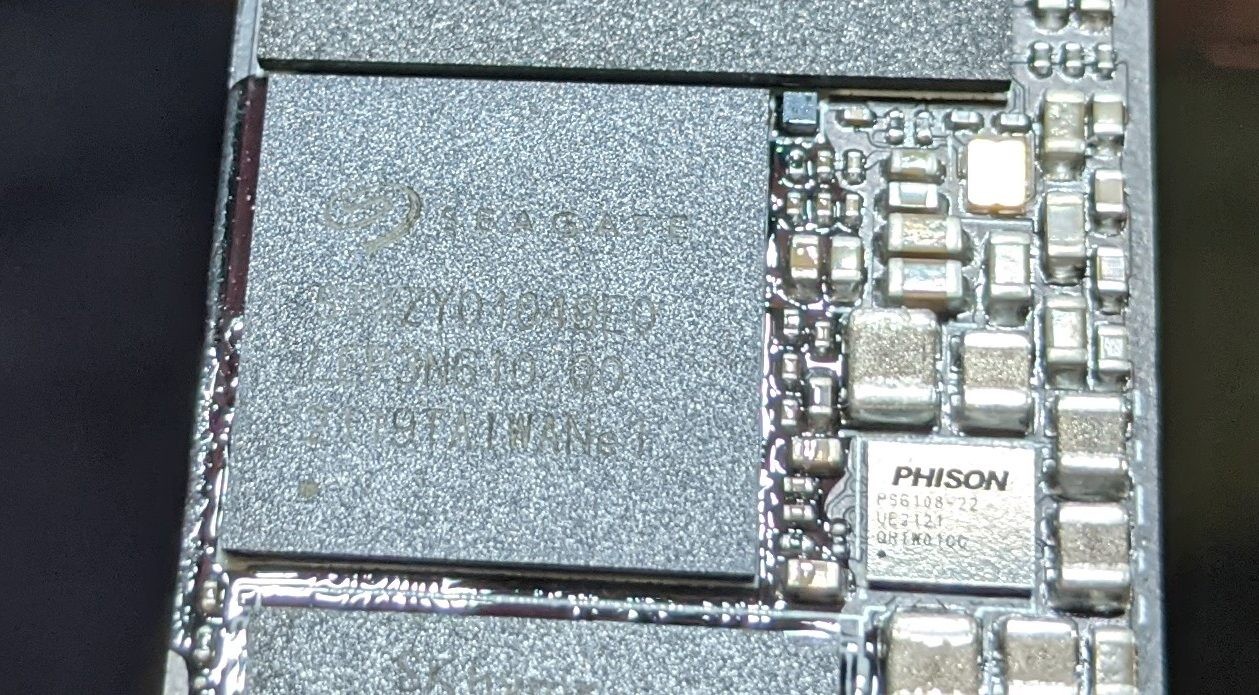
Alongside this controller, the NAND featured on the Seagate Firecuda 530 is quite a top-end choice too. As mentioned, the Phison E18 controller has been featured on a number of other solutions in the last 6+ months, however, the Firecuda 530 arrives with an extra advantage with Micron 176 layered 3D TLC NAND. This is very important, as this massive jump over the bulk of other SSDs that arrive with 96L NAND allows better-sustained performance through the drives lifetime and (more importantly) a MUCH higher endurance rating. With most other M.2 PCIe4 NVMe SSDs arriving with 0.3 or 0.38 drive writes per day, this one is rated at 0.7 DWPD. Even if you are not planning on hammered this drive daily, that only means this SSD NAND will last even longer and will in all likelihood massively outline whatever system it is installed within.
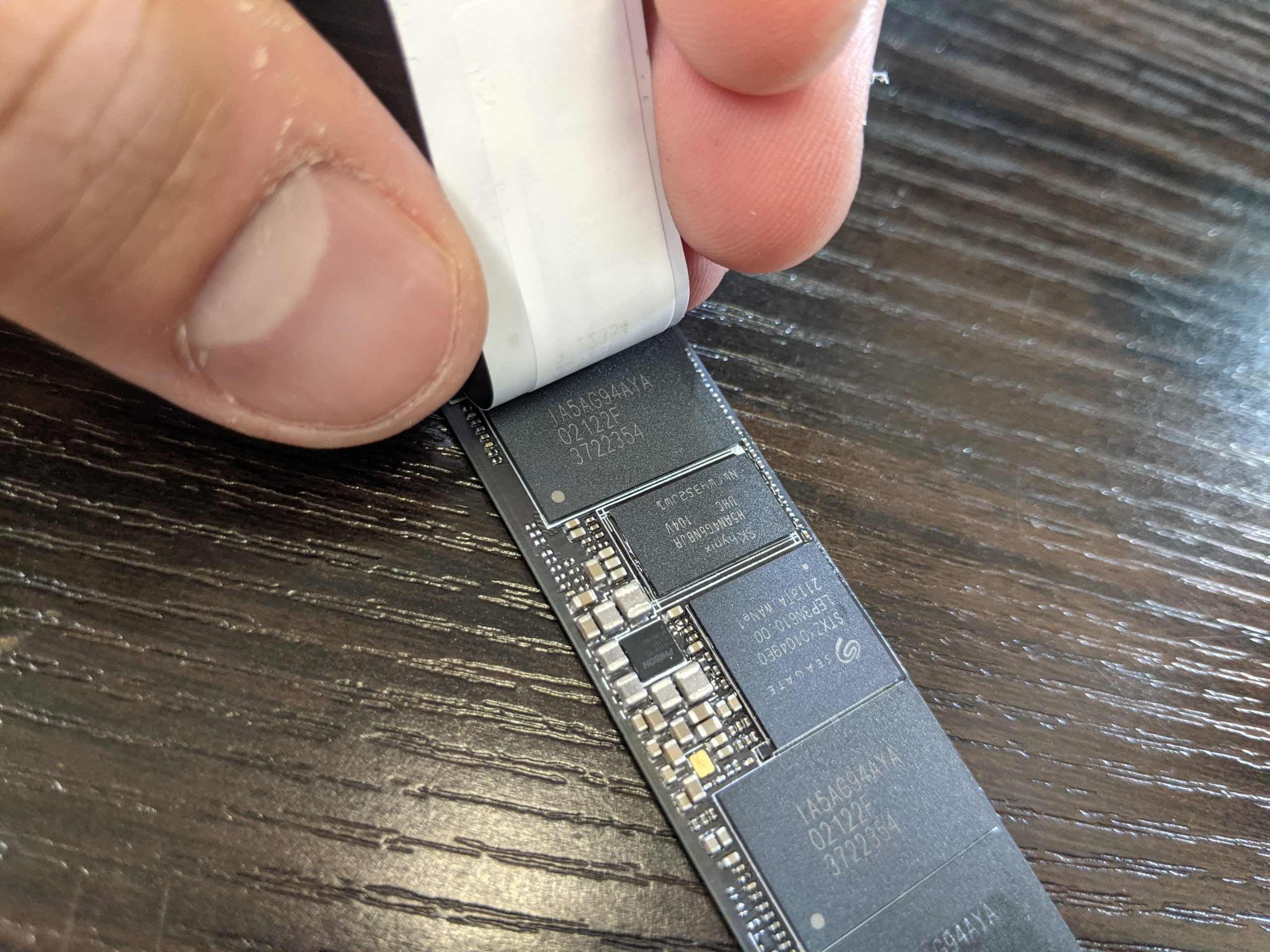
Alongside the controller and NAND, the Firecuda 530 features DD4 DRAM/memory. This scales in capacity alongside each storage tier of the series. Another interesting thing of note on the Seagate Firecuda 530 SSD drive physically is that regardless of whether you chooses the 500GB, 1TB, 2TB or 4TB, they ALL arrive at 2280 length. This is to be expected on the smaller capacities, but the 4TB in particular managing to hit that cap without resorting to a 22110 (without compromising the NAND storage to QLC etc) is impressive indeed. This does mean that the 2TB and 4TB model then need to be double-sided drives (something to factor in at the heatsink level on more compact PC and console systems like PS5) but never the less, only 2-3 brands including Seagate include a 4TB drive at this architecture and performance threshold.
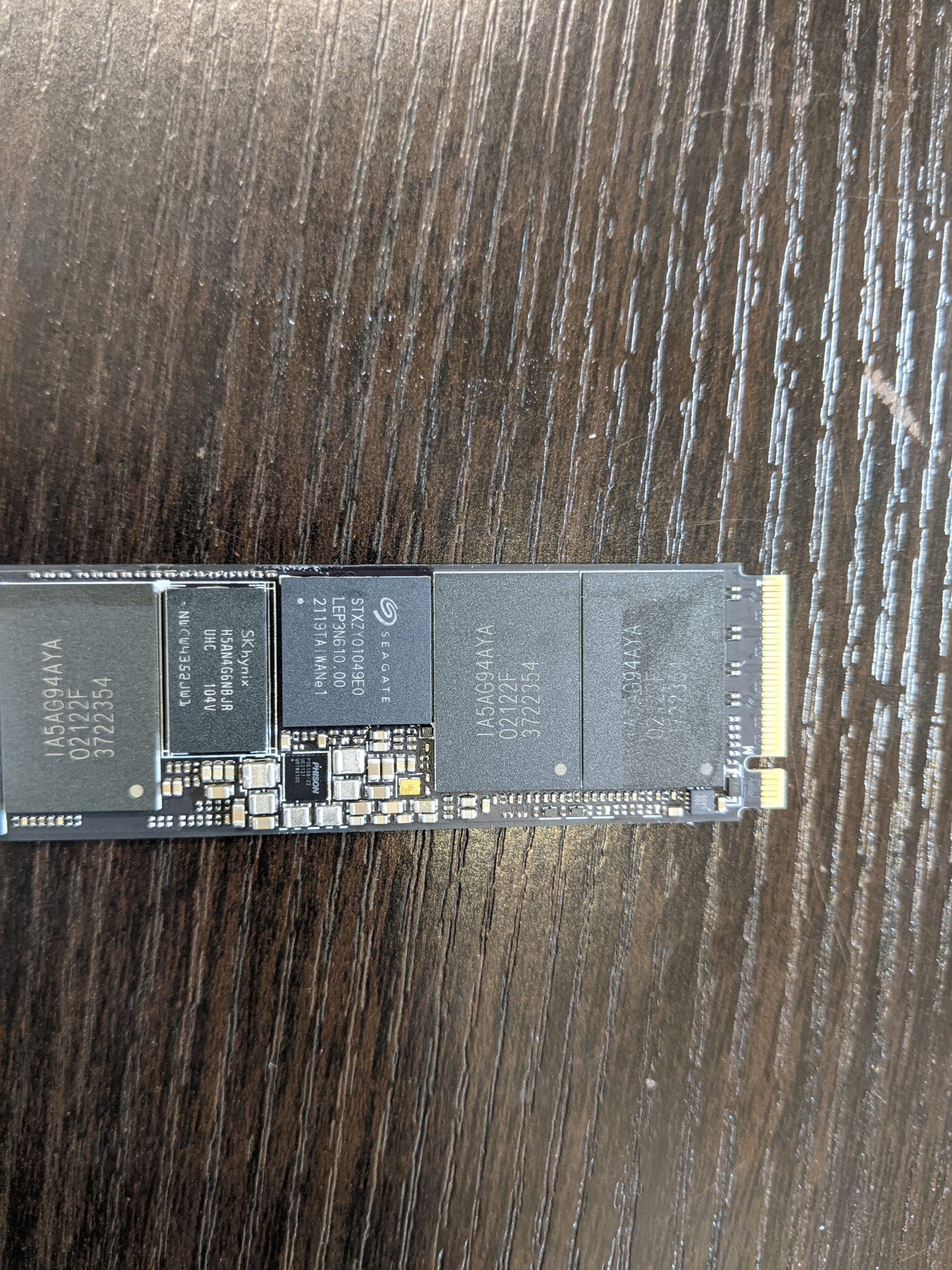
As mentioned (about a million times, I know) the Firecuda 530 features M.2 PCIe4 architecture, arriving in NVMe 1.4 revision. This is an important detail as, although there are currently a large number of PCIe4 M.2 SSDs on the market, some are using older revisions. This can be updated in some cases, but it is by no means consumer-friendly/universal.
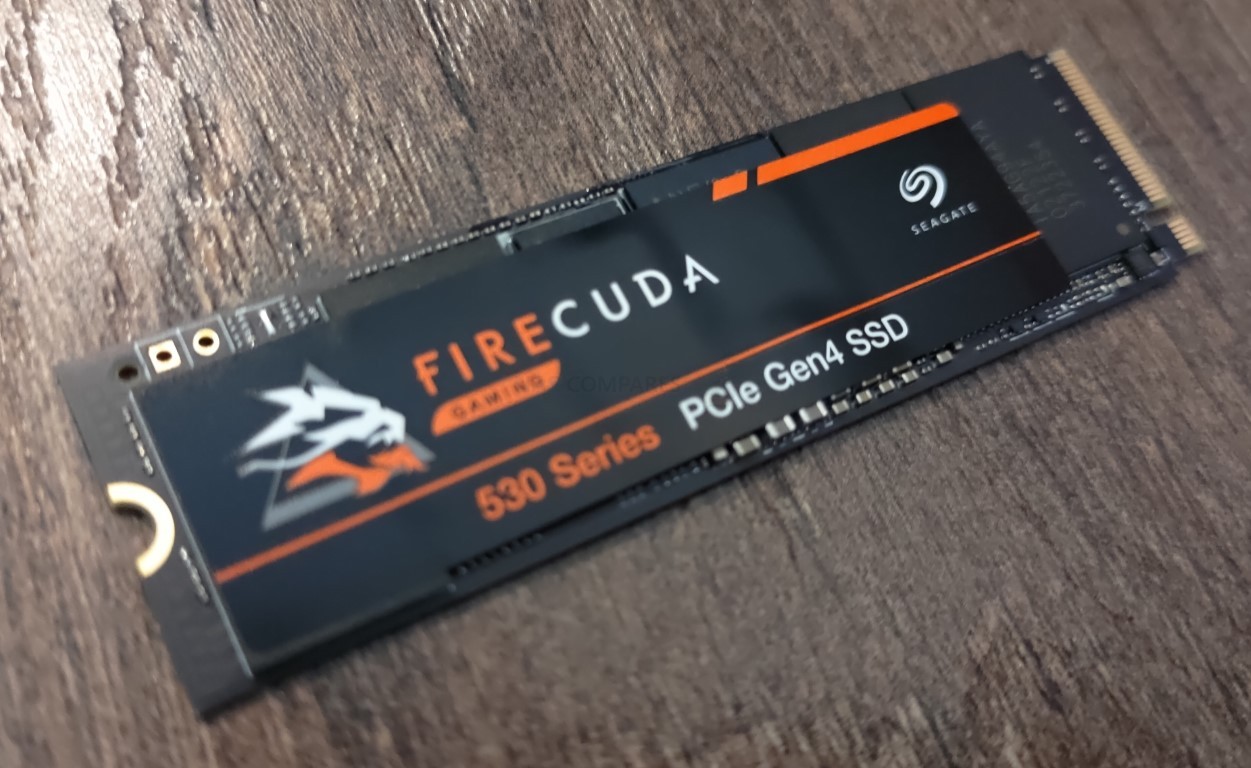
Overall, you really cannot fault the hardware inside/onboard the Seagate Firecuda 530, as it is still by far one of the highest performing sequential Read and Write drives in the market over many other M.2 NVMe PCIe 4 SSDs released in the last 6-8 months. Before we go into the full testing, however, it is worth taking a moment to look closely at the reported performance benchmarks of the Seagate Firecuda 530, as although the performance is good, there are areas such as IOPS and endurance when compared with its main rivals that make quite a stark contrast.
Seagate Firecuda 530 SSD Review – Official Stats First
Before we conduct our own testing on this SSD, Let’s take a closer look at the reported specifications and benchmarks first. The Seagate Firecuda 530 SSD arrives in four capacities at 500GB,1TB, 2TB and 4TB. The Prices currently are a little inconsistent (with each higher capacity tier actually having a higher price per GB – quite unusual) likely due to the hardware shortages, the Pandemic, Chia has affected SSD availability in the last 12 months and most recently the announcement that PS5 supports this SSD and it has increased the current price of most models around 20%! Below is a breakdown of how each Firecuda 530 SSD compares:
| Drive | Firecuda 530 500GB
|
Firecuda 530 1000GB
|
Firecuda 530 2000GB
|
Firecuda 530 4000GB
|
| Price | 500GB – $149.99 | 1TB – $239.99 | 2TB – $489.99 | 4TB – $949.99 |
| Warranty, Limited (years) | 5+3yr Rescue | 5+3yr Rescue | 5+3yr Rescue | 5+3yr Rescue |
| PCIe Gen M.2 | PCIe Gen 4×4 | PCIe Gen 4×4 | PCIe Gen 4×4 | PCIe Gen 4×4 |
| NVMe Rev | NVMe 1.4 | NVMe 1.4 | NVMe 1.4 | NVMe 1.4 |
| NAND Type | 176L 3D NAND | 176L 3D NAND | 176L 3D NAND | 176L 3D NAND |
| Controller | E18-PS018 | E18-PS018 | E18-PS018 | E18-PS018 |
| Performance | ZP500GM3A013 | ZP1000GM3A013 | ZP2000GM3A013 | ZP4000GM3A013 |
| Sequential Read (Max, MB/s), 128 KB | 7000MB | 7300MB | 7300MB | 7300MB |
| Sequential Write (Max, MB/s), 128 KB | 3000MB | 6000MB | 6900MB | 6900MB |
| IOPS | ZP500GM3A013 | ZP1000GM3A013 | ZP2000GM3A013 | ZP4000GM3A013 |
| Random Read (Max, IOPS), 4 KB QD32 | 400,000 | 800,000 | 1,000,000 | 1,000,000 |
| Random Write (Max, IOPS), 4 KB QD32 | 700,000 | 1,000,000 | 1,000,000 | 1,000,000 |
| DWPD | 0.7 | 0.7 | 0.7 | 0.7 |
| MTBF, hours | 1,800,000 | 1,800,000 | 1,800,000 | 1,800,000 |
The first very clear thing is that the performance clearly scales quite hugely as you go through each capacity tier. The 500GB model features a rather underwhelming 3000GB sequential write compared with the more than double 6,000MB/s and 6,900MB/s reported on the rest of the series, but the sequential read performance of all capacities is still reported at 7,000MB/s (with a peak of 7,300MB/s at the highest end). Likewise, the 4K IOPS scales noticeably through the tiers, with the 500GB being the only version that does not break the 1,000,000 IOPS rating. Understandably this is an architecture/physical NAND scale limitation, but it definitely worth highlighting, as many buyers who are looking at the Seagate Firecuda 530 series and are somewhat intimidated by the higher price tag over other M.2 PCIe4 NVMe SSDs (but still want the endurance and durability of use) might scale to the 500GB model and then be unaware they are getting a very different ‘write’ experience. That said, modern PC and console gamers who are going to use the Seagate Firecuda 530 are going to largely need to focus on Read activity. For a better understanding of the most commonly used terms in the word of SSDs, take a moment to watch my video below that breaks down all of the most complex and repeated terms and anacronyms into plain, chewable English!
So, now you know the hardware specifications, the performance benchmarks and exactly what makes the Seagate Firecuda 530 a particularly advantageous drive. However, there are quite a few drives n the shelves right now that are shoving for gamer’s attention and for both PS5 and PC Gamers alike, there are 2 main alternative drives, the WD Black SN850 and Samsung 980 Pro. These two alternative drives have been available to consumers for well over 8 months and in that time have dominated this tier of the storage market significantly. The WD and Samsung gamer SSD arrived on the market last year at a lower price point than the Seagate Firecuda 530, as well as had plenty of time to get more flexible with that price in the meantime. So, with the Seagate SSD arriving at a higher price point, they can only really win on the subject of VALUE, not the price tag. Ultimately, what you GET for your money in terms of performance, responsiveness, service and (Seagate hope) durability. Below is how these three SSDs compare at each available capacity tier:
| Brand/Series
|
Seagate Firecuda 530
|
WD Black SN850
|
Samsung 980 Pro
|
| 500GB Model | ZP500GM3A013 | WDS500G1X0E-00AFY0 | MZ-V8P500BW |
| Price in $ and $ | $139 / £119 | $119 / £99 | $119 / £109 |
| 1TB Model | ZP1000GM3A013 | WDS100T1X0E-00AFY0 | MZ-V8P1T0BW |
| Price in $ and $ | $239 / £199 | $249 / £169 | $209 / £179 |
| 2TB Model | ZP2000GM3A013 | WDS200T1X0E-00AFY0 | MZ-V8P2T0BW |
| Price in $ and $ | $419 / £379 | $399 / £339 | $390 / £369 |
| 4TB Model | ZP4000GM3A013 | N/A | |
| Price in $ and $ | $949 / £769 | N/A | N/A |
| Brand/Series | Seagate Firecuda 530 | WD Black SN850 | Samsung 980 Pro |
| PCIe Generation | PCIe Gen 4 | PCIe Gen 4 | PCIe Gen 4 |
| NVMe Rev | NVMe 1.4 | NVMe 1.4 | NVMe 1.3c |
| NAND | 3D TLC Micron B47R 176L | BiCS4 96L TLC | 3D TLC |
| Max Capacity | 4TB – Double Sided | 2TB | 2TB |
| Controller | Phison E18-PS5018 | WD_BLACK G2 | Custom Elpis |
| Warranty | 5yr + Data Recovery 3yrs | 5yr | 5yr |
| Mean Time Between Failures (MTBF, hours) | 1,800,000 | 1,750,000 | 1,500,000 |
| DWPD | 0.7DWPD | 0.3DWPD | 0.3DWPD |
| 500GB Model | ZP500GM3A013 | WDS500G1X0E-00AFY0 | MZ-V8P500BW |
| Sequential Read (Max, MB/s), 128 KB | 7000MB | 7000MB | 6900MB |
| Sequential Write (Max, MB/s), 128 KB | 3000MB | 4100MB | 5000MB |
| 1TB Model | ZP1000GM3A013 | WDS100T1X0E-00AFY0 | MZ-V8P1T0BW |
| Sequential Read (Max, MB/s), 128 KB | 7300MB | 7000MB | 7000MB |
| Sequential Write (Max, MB/s), 128 KB | 6000MB | 5300MB | 5000MB |
| 2TB Model | ZP2000GM3A013 | WDS200T1X0E-00AFY0 | MZ-V8P2T0BW |
| Sequential Read (Max, MB/s), 128 KB | 7300MB | 7000MB | 7000MB |
| Sequential Write (Max, MB/s), 128 KB | 6900MB | 5100MB | 5100MB |
| 4TB Model | ZP4000GM3A013 | N/A | |
| Sequential Read (Max, MB/s), 128 KB | 7300MB | N/A | N/A |
| Sequential Write (Max, MB/s), 128 KB | 6900MB | N/A | N/A |
| Brand/Series | Seagate Firecuda 530 | WD Black SN850 | Samsung 980 Pro |
| 500GB Model | ZP500GM3A013 | WDS500G1X0E-00AFY0 | MZ-V8P500BW |
| Random Read (Max, IOPS), 4 KB QD32 | 400,000 | 1,000,000 | 800,000 |
| Random Write (Max, IOPS), 4 KB QD32 | 700,000 | 680,000 | 1,000,000 |
| 1TB Model | ZP1000GM3A013 | WDS100T1X0E-00AFY0 | MZ-V8P1T0BW |
| Random Read (Max, IOPS), 4 KB QD32 | 800000 | 1,000,000 | 1000000 |
| Random Write (Max, IOPS), 4 KB QD32 | 1000000 | 720,000 | 1000000 |
| 2TB Model | ZP2000GM3A013 | WDS200T1X0E-00AFY0 | MZ-V8P2T0BW |
| Random Read (Max, IOPS), 4 KB QD32 | 1,000,000 | 1,000,000 | 1,000,000 |
| Random Write (Max, IOPS), 4 KB QD32 | 1,000,000 | 710,000 | 1,000,000 |
| 4TB Model | ZP4000GM3A013 | N/A | |
| Random Read (Max, IOPS), 4 KB QD32 | 1,000,000 | N/A | N/A |
| Random Write (Max, IOPS), 4 KB QD32 | 1,000,000 | N/A | N/A |
So, when looking at these drives, we have to look at the advantages and disadvantages of the Seagate Firecuda 530 vs the WD Black SN850 and Samsung 980 Pro. They break down as follows:
+ Highest Peak Performance at 1TB and 2TB
+ 4 Terabyte Option
+ More Than Double The Reported Endurance & Durability than WD/Samsung
+ Inclusive Rescue Data Recovery Service
– More Expensive at ALL Capacities
– 500GB Model Has Noticeably Lower Seq Write than 500GB WD/Samsung
– Not 100% Developed In-house
Overall, I do genuinely think that Seagate and the Firecuda 530 win overall on points versus the Samsung 980 Pro and WD Black SN850. It definitely costs more, but you seemingly get quite a lot for your money. That does mean that you need to price these SSDs in terms of their lifetime utility and value (which many might not want or need to), but Seagate does make a compelling argument here. Additionally, the available 4TB drive will please a lot of professional gamers, as that is quite a lot of space to play with – albeit at quite an intimidating price tag! Let’s get the Seagate Firecuda 530 in the test machine:
Testing the Seagate Firecuda 530 500GB m.2 PCIE4 NVMe SSD
When testing the Seagate Firecuda 530, I wanted to perform a good balance of consumer-accessible tests. So the results below come from testing this 500GB SSD on a PC system and loading game tests from a PS5 system (for those considering this SSD for a console gaming system).
PC Test Machine:
- Windows 10 Pro Desktop System
- Intel i5 11400 Rocket Lake – 6-Core 2.6/4.4Ghz
- 16GB DDR4 2666MHz Memory
- Intel B560M mATX Motherboard
- OS Storage, Seagate Firecuda 120 SSD
- Test SSD connected to Secondary PCIe Gen 4 M.2 Slot
Note – It is VERY IMPORTANT to read these performance benchmarks in the context that they were made with the 500GB model of the Firecuda 530 series. Like most M.2 NVMe SSDs, the Firecuda 530 series scales in performance as you go into larger capacities, as there is a larger arrangement of NAND available on the board and improved distribution of data. Later in August/September, we hope to be bench-testing larger capacities and updating this review, alongside added new ones that reflect the increased performance these larger drives can provide. Otherwise, you can read the great review over on Tweaktown that features the 1TB Model. Let’s get back to the testing!
The Drive was first checked on Crystal Disk to check that it was clearly accessible, utilizing the PCIe Gen 4 bandwidth interface fully and was in good, healthy working order.
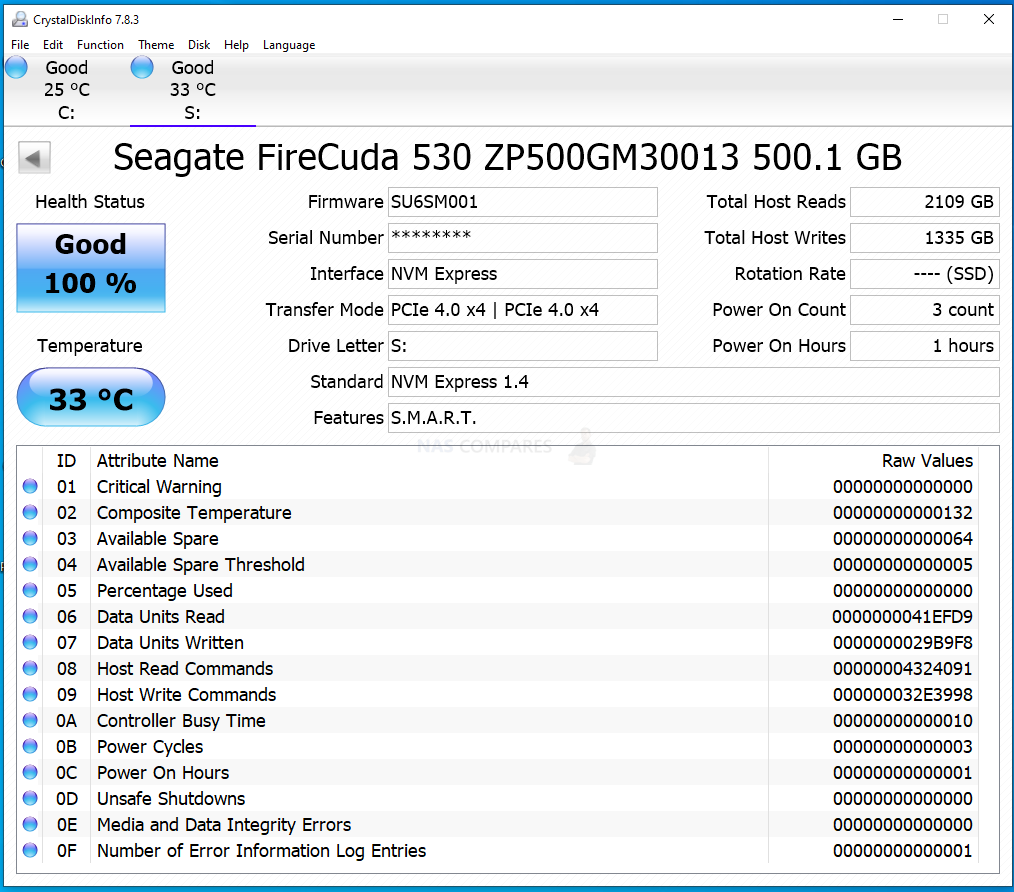
The PC Tests of the Seagate Firecuda 530 500GB SSD included ATTO Diskbench Mark, CrystalDisk, AS SSD and spikes of AJA Disk Speed Test (over time).
Seagate Firecuda 530 500GB – 1GB Test
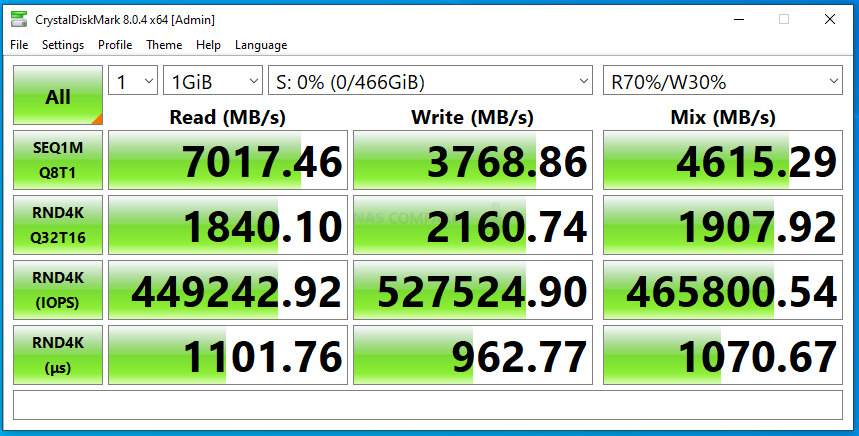
Seagate Firecuda 530 500GB – 4GB
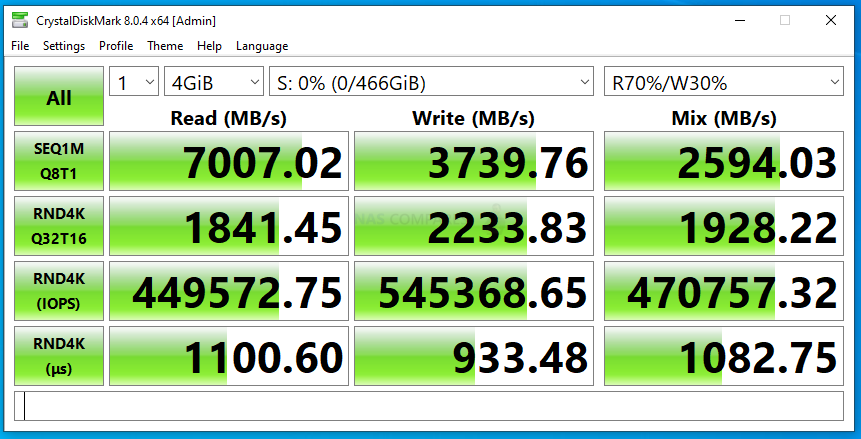
Seagate Firecuda 530 500GB – 16GB
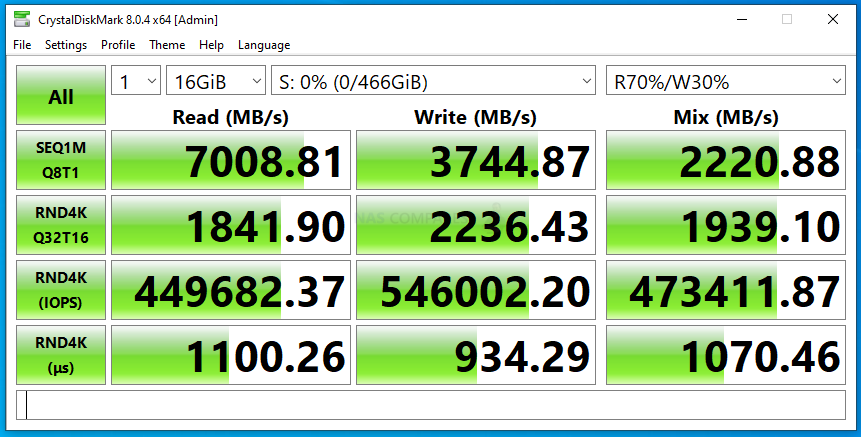
Seagate Firecuda 530 500GB – ATTO 256MB Test
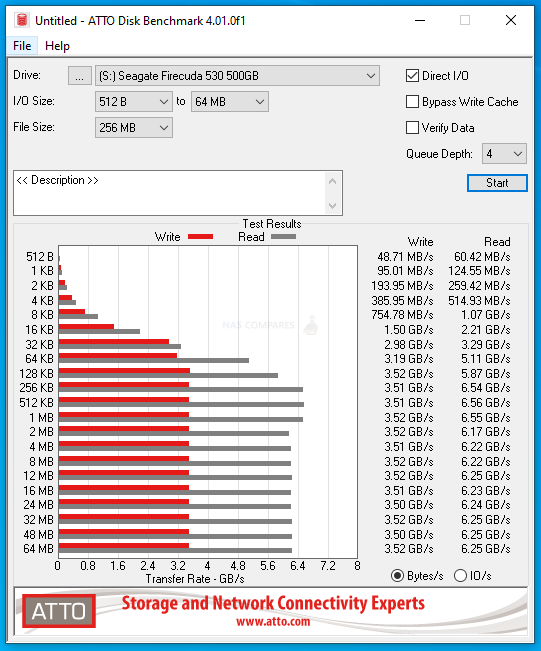 |
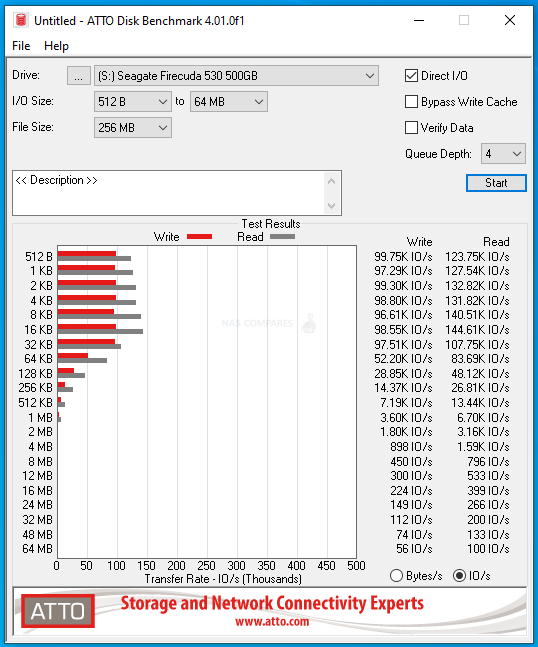 |
Seagate Firecuda 530 500GB – ATTO 1GB Test
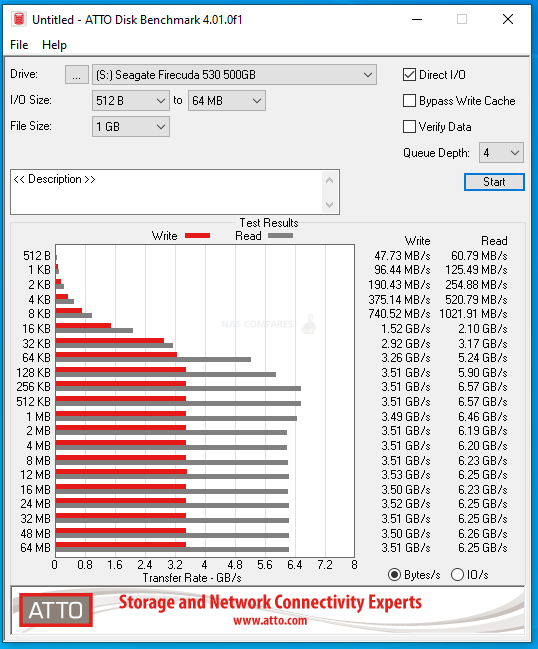 |
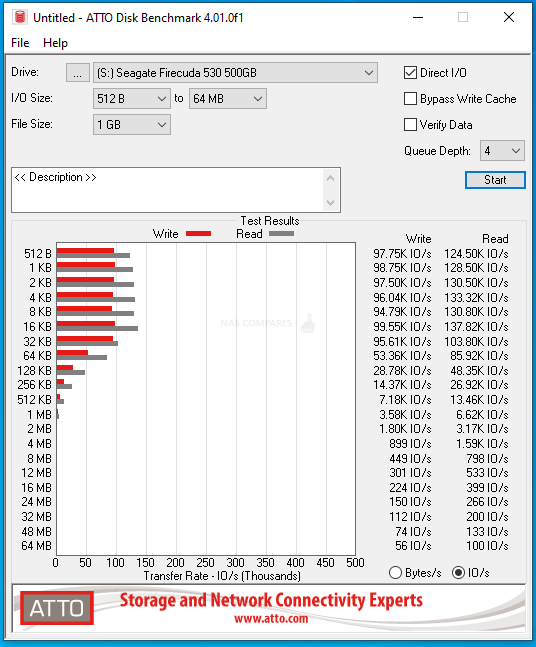 |
Seagate Firecuda 530 500GB – ATTO 4GB Test
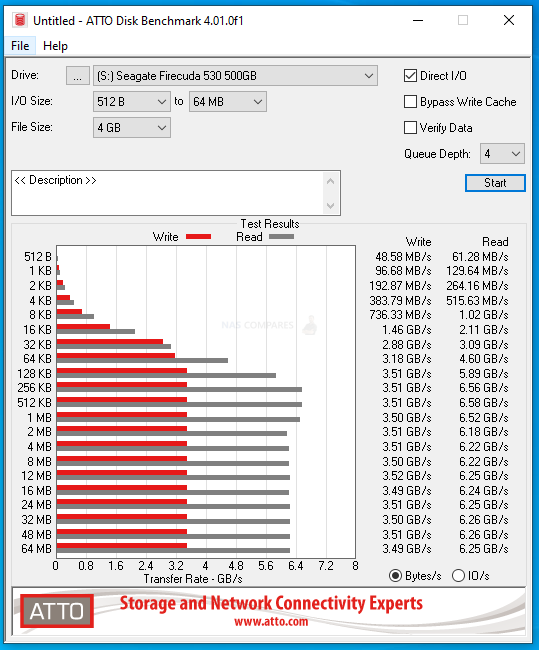 |
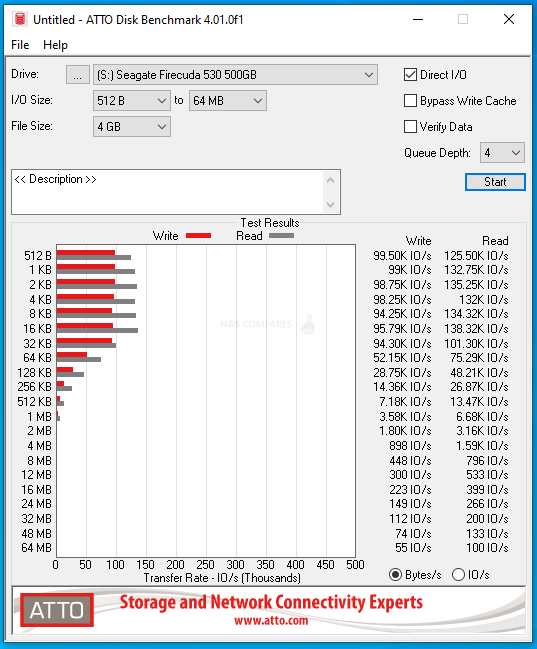 |
Seagate Firecuda 530 500GB – AS SSD Tests
We performed three different file type tests in AS SSD, 1GB, 3GB and 5GB. They were as follows:
AS SSD 1GB TEST FILE
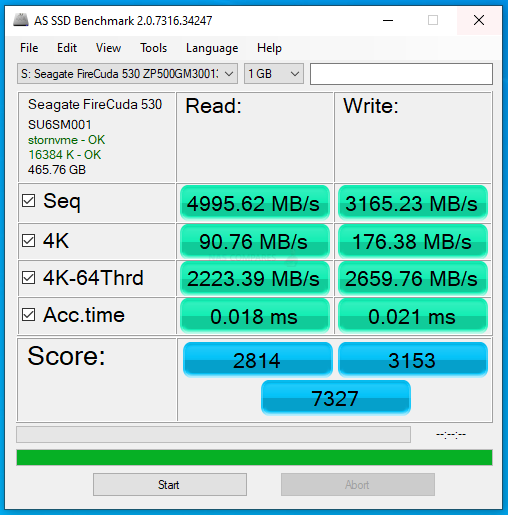 |
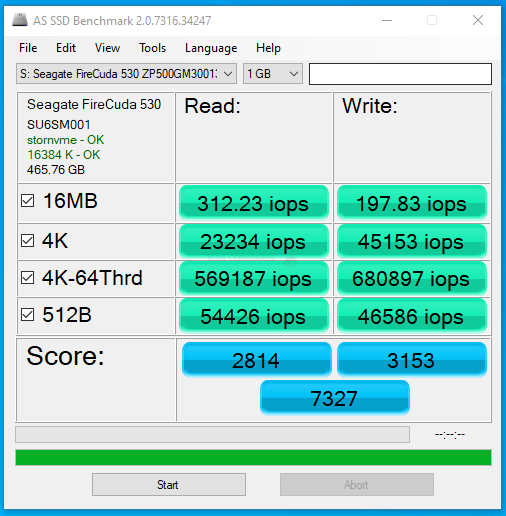 |
AS SSD 3GB TEST FILE
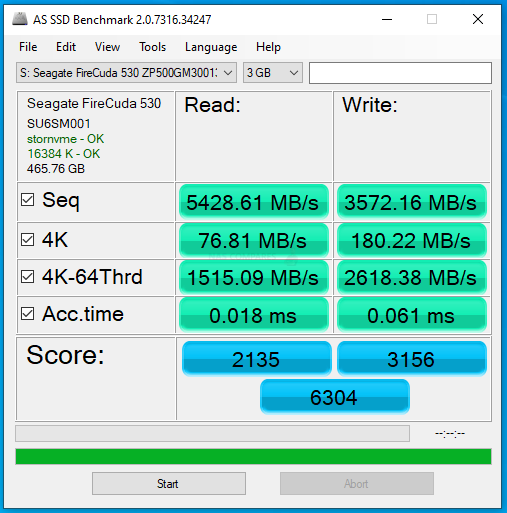 |
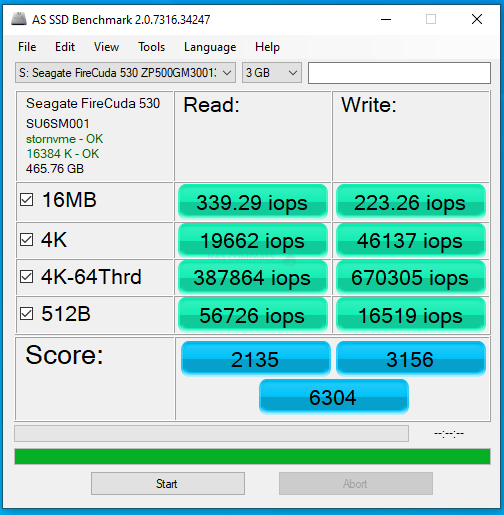 |
AS SSD 5GB TEST FILE
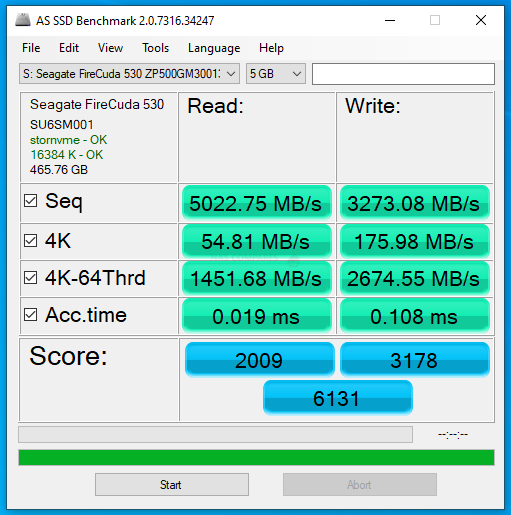 |
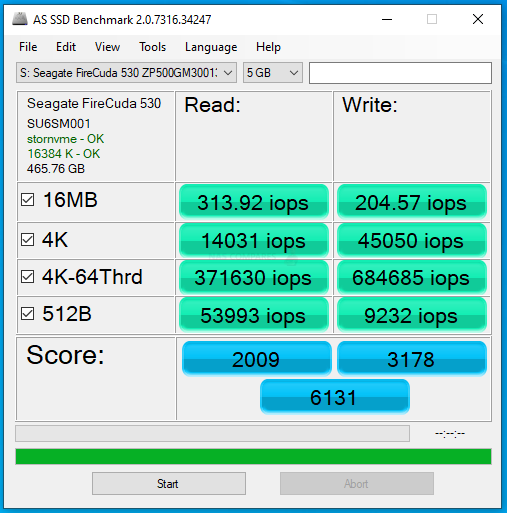 |
Ordinarily, I would introduce tests like BlackMagic and AJA into the mix here, but even a short burst of testing on an NVMe like this would over saturate the cache memory on board. Nevertheless, in the short term we still could ascertain the reported performance on 1GB, 4GB and 16GB file testing was:
Seagate Firecuda 530 500GB 1GB AJA File Test Results (Max)
5,612MB/s Read & 4,529MB/s Write

Seagate Firecuda 530 500GB 4GB AJA File Test Results (Max)
5,600MB/s Read & 4,732MB/s Write

Seagate Firecuda 530 500GB 16GB AJA File Test Results (Max)
5,455MB/s Read & 4,903MB/s Write

Seagate Firecuda 530 500GB – Playstation 5 Load Times
Below I tested 4 different games on the Playstation 5, with each game being stored on the m.2 SSD expansion slot populated with the Seagate Firecuda 530. In three out of four cases, the game loaded 1 Sec + faster on the Seagate:
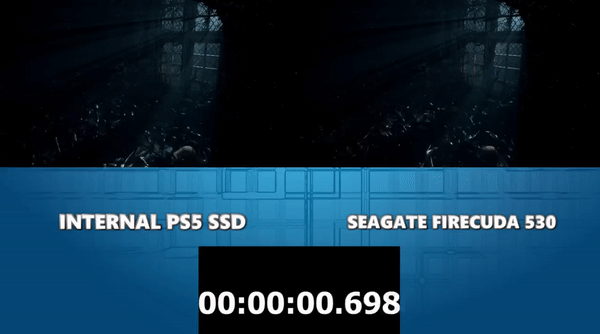 |
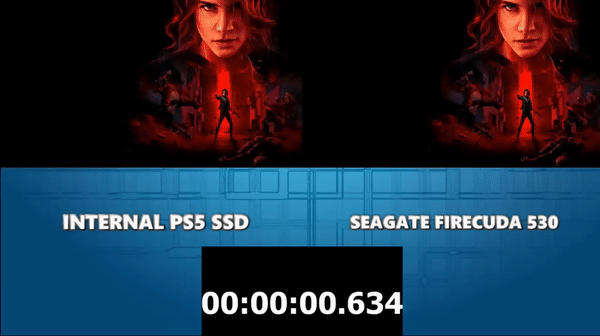 |
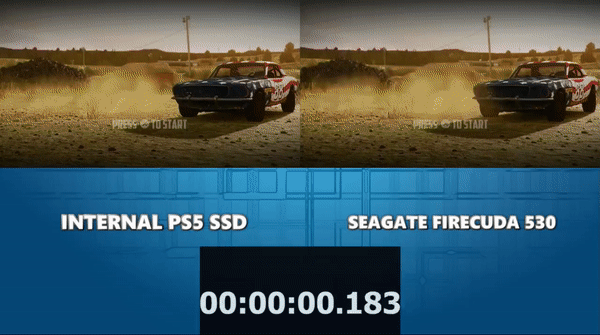 |
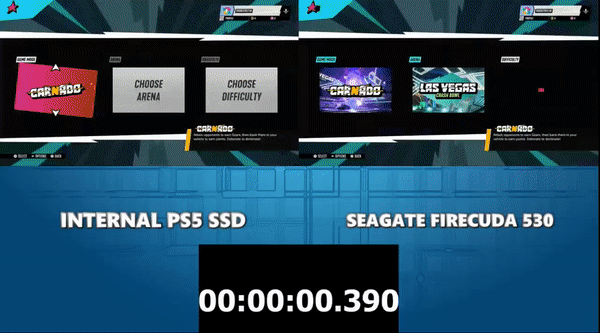 |
Overall, the Seagate Firecuda 530 was certainly able to provide some solid read performance, though clearly the fact this review features the 500GB drive has undermined the write activity. I am fully confident that larger capacity testing (coming soon) will live up to their respective reported benchmarks, as well as potentially exceed the test figures here on a more powerful machine.
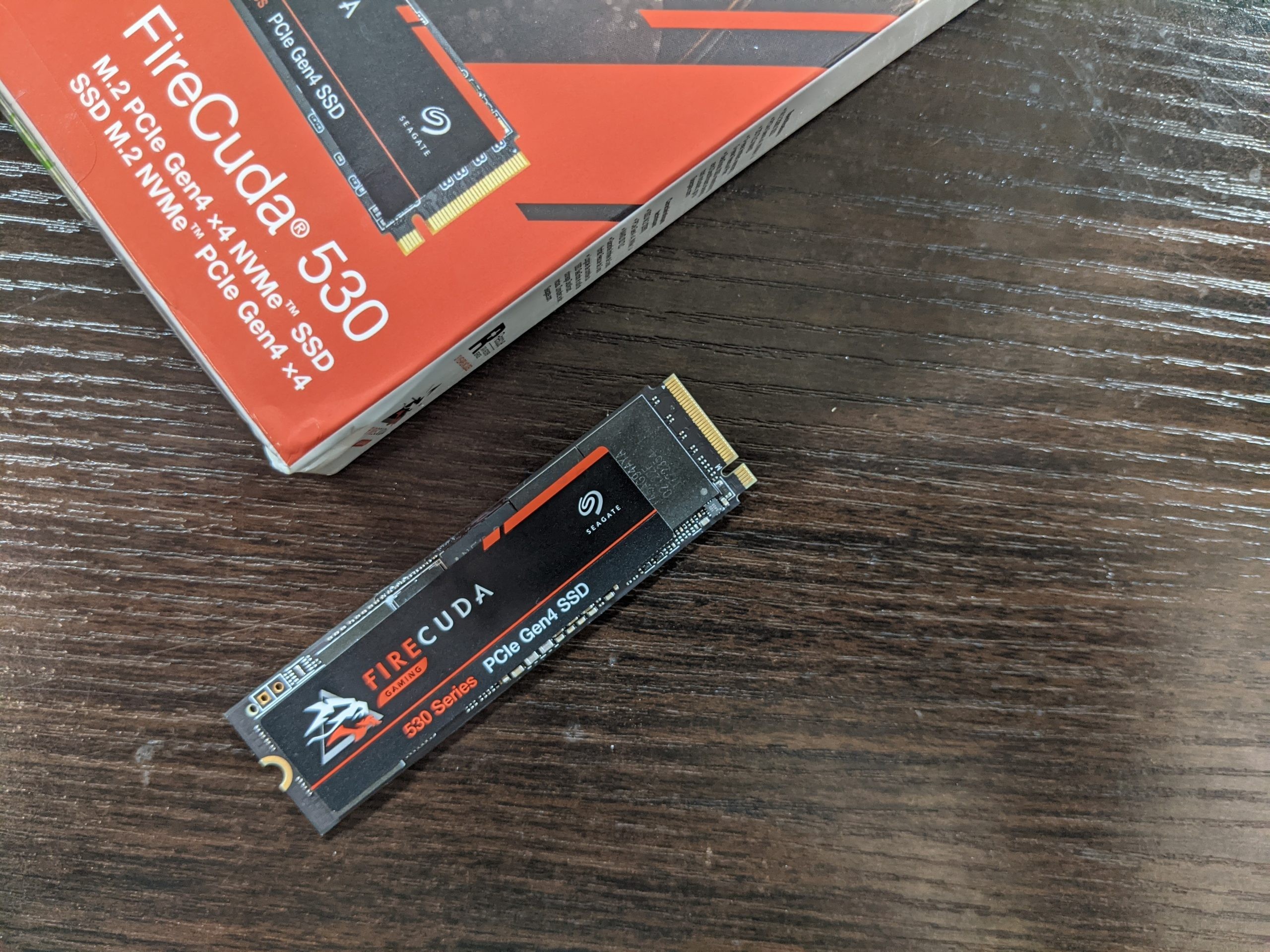
Seagate Firecuda 530 SSD Review – Conclusion
For the most part, I DO think Seagate has succeeded in fulfilling the promises they have made on the Firecuda 530 and have arguably released the best example of m.2 PCIe4 NVMe SSD architecture you can buy in 2021. There is no avoiding the fact that the Seagate Firecuda 530 series of SSDs have arrived on the market noticeably later than their biggest rivals AND with a higher price tag, so they were going to need to make a pretty good early impression to make up the ground amply covered by their competitors. The decision to focus heavily on endurance and durability is a remarkably mature one (and potentially controversial one against their competitors) in an age when consumers are demanding prices come down, forcing brands to either cut covers where they think they will be felt the least or going the budget router of QC NAND. Therefore you have to respect Seagate’s decision to draw a line in the sand here about what they consider a high-end SSD. Though some buyers might not be as thrilled to pay for these extras that they feel they won’t need, the Firecuda 530 is still pretty much the score to beat in 1TB above, though the 500GB whilst maintaining the price structure of larger drives, might leave you a little less impressed. Overall, I can definitely recommend the Firecuda 530 series, but maybe pay the extra and go for the 1TB at the very least.
| Drive | Firecuda 530 500GB
|
Firecuda 530 1000GB
|
Firecuda 530 2000GB
|
Firecuda 530 4000GB
|
| Price | 500GB – $149.99 | 1TB – $239.99 | 2TB – $489.99 | 4TB – $949.99 |
| PROs of the Seagate Firecuda 530 | CONs of the Seagate Firecuda 530 |
| Highest PCIe 4×4 M.2 Performance Right Now
176 Layer 3D TLC NAND is Unparalleled right now Best Example of Phison E18 Performance Highest Endurance PCIe Gen 4×4 M.2 SSD Right Now Inclusive Data Recovery Services PS5 Compatibility Fully Confirmed Available in up to 4TB |
Costs more than most
The heatsink is an Additional Purchase |
🔒 Join Inner Circle
Get an alert every time something gets added to this specific article!
This description contains links to Amazon. These links will take you to some of the products mentioned in today's content. As an Amazon Associate, I earn from qualifying purchases. Visit the NASCompares Deal Finder to find the best place to buy this device in your region, based on Service, Support and Reputation - Just Search for your NAS Drive in the Box Below
Need Advice on Data Storage from an Expert?
Finally, for free advice about your setup, just leave a message in the comments below here at NASCompares.com and we will get back to you. Need Help?
Where possible (and where appropriate) please provide as much information about your requirements, as then I can arrange the best answer and solution to your needs. Do not worry about your e-mail address being required, it will NOT be used in a mailing list and will NOT be used in any way other than to respond to your enquiry.
Need Help?
Where possible (and where appropriate) please provide as much information about your requirements, as then I can arrange the best answer and solution to your needs. Do not worry about your e-mail address being required, it will NOT be used in a mailing list and will NOT be used in any way other than to respond to your enquiry.

|
 |
CAN YOU TRUST UNIFI REVIEWS? Let's Discuss Reviewing UniFi...
WHERE IS SYNOLOGY DSM 8? and DO YOU CARE? (RAID Room)
UniFi Routers vs OpenWRT DIY Routers - Which Should You Choose?
WHY IS PLEX A BIT S#!t NOW? IS 2026 JELLYFIN TIME? (RAID Room)
Synology FS200T NAS is STILL COMING... But... WHY?
Gl.iNet vs UniFi Travel Routers - Which Should You Buy?
Access content via Patreon or KO-FI





Discover more from NAS Compares
Subscribe to get the latest posts sent to your email.


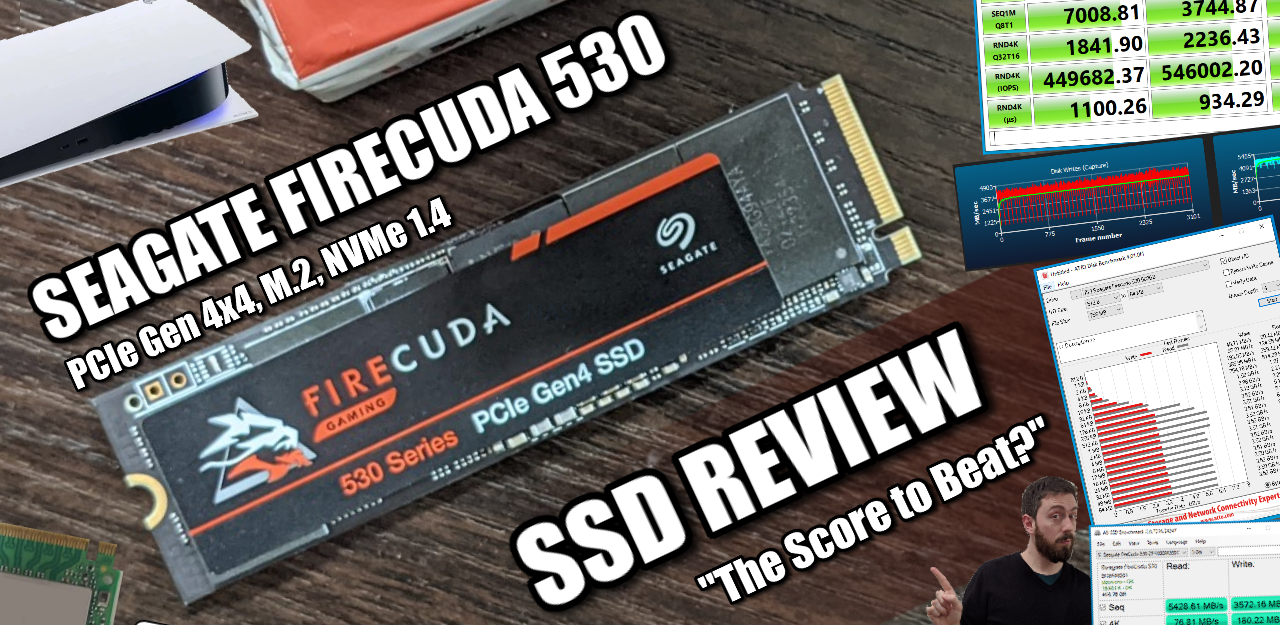






jesus christ man click bait while also tweaking out in stats with like 6 other programs just test it through crystaldisk already i went grey and punched a random baby on the bus ????
REPLY ON YOUTUBE
A really good & detailed video ????
REPLY ON YOUTUBE
It’s still worth buying in 2024.
REPLY ON YOUTUBE
iam scepticle about the tbw. i had several ssd in my life now, current i have a WD red sn700 500g. which is supposed to have 1PB tbw. the drive is a windows drive, nothing more on it, then windows and regular software, no games on the drive and its installed for a year and already down to 98% while having 19tb written
REPLY ON YOUTUBE
I have no idea what your even talking about
REPLY ON YOUTUBE
Watch one bast heat sink version without heat sink
REPLY ON YOUTUBE
How many ps5 games can I have in this device?
REPLY ON YOUTUBE
Excellent video – as always. Which one would you recommend for a PS5 between the Samsung 990 Pro with heatsink VS the Seagate Firecuda 530 with heatsink????
REPLY ON YOUTUBE
Have you done a review on the Venom8 ssd 2tb ?
REPLY ON YOUTUBE
I realize it has been a year since this video was uploaded but I just got my first PS5 and I’m wondering what is the VERY BEST 2TB ssd for it.
REPLY ON YOUTUBE
I just bought one.The 2TB..It has a 2550 TBW .
REPLY ON YOUTUBE
After being burned on so many HDDs from Seagate, I wasn’t gonna even consider them, but since it sounds like they aren’t making the NAND nor controllers, I suppose I can consider them as an option depending on availability at the time to purchase
REPLY ON YOUTUBE
Hello, can it be used for a laptop?? Somewhere it mentions a PC / laptop and
PC is listed somewhere. Do you think it can be used in a notebook for a long time?
REPLY ON YOUTUBE
6:32 That’s exactly what I did with my Seagate Firecuda 530 2tb ssd. ????
REPLY ON YOUTUBE
is it worth for PC?
REPLY ON YOUTUBE
Why is mine only 5700mb??
REPLY ON YOUTUBE
Hi there, forgive my ignorance, does the heat sink model fit the Firecuda 4tb gaming dock?
(I’m not a gamer but I use an old Alienware 17R5 and the Seagate dock to edit photos & videos…)
Cheers!
REPLY ON YOUTUBE
so this is useable on PC correct?
REPLY ON YOUTUBE
what is your motherboard?
REPLY ON YOUTUBE
how does the firecuda compare to the kingston renegade fury?
REPLY ON YOUTUBE
@NASCompares Thanks for your videos and your time invested! One simple yet important question regarding the drive’s stickers.
Can you please verify if the stickers on this drive are Heat Spreaders (Like on the Samsung M.2s) or they are just paper stickers (which is how they feel to be) and meant to be removed before applying the thermal pads on it???
Your answer will be of much help!
REPLY ON YOUTUBE
Is th e 530 faster than the internal ssd
REPLY ON YOUTUBE
Just purchased a FireCuda 530 NVMe 4TB SSD with heatsink today for my gaming rig and your videos have been very useful in getting my knowledge about SSD’s up to snuff, allowing me to make an informed purchase.
Initially I wanted a lower spec’d but somewhat cheaper Western Digital Red SN700 NVMe 4TB SSD, as it had superb endurance (that being the main statistic I care about, second to which comes performance), but the availability on it is awful in most of Europe at the moment and the EU storefront for Western Digital rejected three separate attempts at payment with a perfectly valid card (perhaps because it’s my wife’s card, but I’ll never know, as that’s not an issue where I live and thus put me off buying from them). As such, I did more research and decided to pay ~160 EUR extra in order to upgrade my purchase to a FireCuda 530 – it being of the few SSDs that provide the same high endurance that the WD Red did (5100 TBW), while offering more than double in terms of sequential R/W speeds (7250/6900 vs 3400/3100).
Given that I’ve only ever used HDDs for the past 21 years, I’m looking forward to finally getting aboard the SSD-train in a few days.
REPLY ON YOUTUBE
Greeting NAS, I bought the 1Tb model with no heatsink. And it runs really hot as much as 67C on test with Crystal. 7 is normal read. Haven’t broken the 6 barrier. I have a few drivers, Micron(2021), Phison(older), Modded Samsung NVMe driver for 980’s, and non-Samsung, and OOB Standard one. I found consistently that the heat on these non-Heatsink models, hits a near thermal state. What driver do you use? Storage Controller.. and I didn’t know there were two versions being sold of these FireCuda’s until after I placed an order. However I purchased and EKWB heatsink that is common type for any NVMe drive. Seems the heatsink that comes with FireCuda, does a fantastic job at keeping very low temps. Unfortunately Seagate does not sell these heatsinks separately. Great Review
REPLY ON YOUTUBE
Just got the 2TB version and I’m absolutely loving it
REPLY ON YOUTUBE
I have a new PC with a B560-G Asus ROG Strix Gaming with Wifi motherboard paired with an Intel 11600K processor. In addition to this is a twin Corsair Vengeance RAM kit totalling 2 x 8GB with a factory overclocked speed of 3600Gb/s. Nothing else is over clocked. Storage is a single m.2 nvme 1TB Seagate Firecuda 530. This stick’s performance is incredibly fast in benchmark tests. When it comes to real life performance, the Firecuda performance is on par with the Micron (Crucial) 2.5″ SSD. The Crucial is rated at 550 – 650 GB/s where the Firecuda 530 is rated at 7300/6500 GB/s… 11 times faster than the 2.5″ Crucial SSD. In real life the Firecuda is much much slower than it’s rated speeds. With little stress my computer is running cool at about 35°C. The motherboard and ambient temperature is about 27°C.
REPLY ON YOUTUBE
FireCuda 530 uses Micron’s 176 layer NAND.
REPLY ON YOUTUBE
Wish the PlayStation 5 came with similar internal storage
REPLY ON YOUTUBE
Hello! Is this SSD able to be installed inside my laptop Lenovo Yoga 900 13isk 80mk? Thanks!
REPLY ON YOUTUBE
Picked up the 2 TB version in September ’22 for about 180 USD! These has for sure come down in price!
REPLY ON YOUTUBE
Can you show how to update firecuda 530 SSD firmware on a PC or Mac. Nobody talks about it or shows it. But you are the best in the business so I know you could do it! Thanks in advance.
REPLY ON YOUTUBE
picked up a 2TB heatsink on ebay brand new for 180£, pretty happy xD
REPLY ON YOUTUBE
This is useless without comparison to other drives
REPLY ON YOUTUBE
Just bought 2 of the 2 tb 530’s for my new 12900k pc build. Thanks for the info!!
REPLY ON YOUTUBE
whats better? WD_BLACK sn850 or the Firecuda 530
REPLY ON YOUTUBE
would have been nice to see a copy test being done, to the same drive and to another nvme drive.
REPLY ON YOUTUBE
Why people always use benchmark.just run game loads and real application loads.
REPLY ON YOUTUBE
Hello sir. Thank you for detailed information about seaget firecuda 530 m.2 SSD. I bought it after i watched your video. But i couldn’te find a detailed guide to apply firmware update. Could you nake a video about firmware update? Love your videos. Thank you.
REPLY ON YOUTUBE
geez do you yap yap yap 10 min of yap yap
REPLY ON YOUTUBE
building a new pc, do i need a seperate hard drive or another ssd for storage? i see so many builds with an m.2 drive along with another drive.. can’t i just get one of these for windows and games and that’s it? i’m not exactly sure why i see builds with two seperate drives. thanks in advanced
REPLY ON YOUTUBE
Right as I was thinking “aww, seagulls”
“I hate seagulls”
REPLY ON YOUTUBE
Which one is better 500 or 1TB ???
REPLY ON YOUTUBE
I just purchased the 1TB version with heatsink. Do i need to do a firmware update on it before I install it on my ps5?? Thanks
REPLY ON YOUTUBE
Does the sBrent or elecgear fit above the firecuda box version?
REPLY ON YOUTUBE
Is the Firecuda the coolest temperature Gen4 SSD? I need to know because my system is SFF
REPLY ON YOUTUBE
Cheers for all your reviews, I ended up going for the 4tb heatsink version for my ps5, apparently the 4tb is faster then the rest as it’s 73006900, got it for £530 pounds as well so a bargain in my opinion, thanks for your hard work.
REPLY ON YOUTUBE
I bought a 4tb firecuda 530 a few months ago. I don’t see the hype about it, maybe I’m missing something. 850 spent on a superfamily download speed USB for ps5 and it doesn’t really seem that incredible. Maybe I’m being a bit salty or I’m missing something but currently feel like I could of saved 700 and got a 4 to plug in storage device….
REPLY ON YOUTUBE
Who cares about the Crystal Disk Mark tests when the actual copy speed, even for a very large file, isn’t more than 2GB/s, when as per Seagate’s claim, it should be around 6GBs/. Pathetic SSD indeed!
REPLY ON YOUTUBE
on Firecuda 530 2TB I get 5500MB/s black magic disk speed test and 6500MB/s in crystal disk mark and 800MB/s file transfer to Samsung touch t7 not quite 7500MB/s reviews state
REPLY ON YOUTUBE
on Firecuda 530 2TB I get 5500MB/s black magic disk speed test and 6500MB/s in crystal disk mark and 800MB/s file transfer to Samsung touch t7
REPLY ON YOUTUBE
is it worth having a heat sink? My toweer has a window and I can open that whole side of the desktop to get fresh air in, and also, I have a bunch of fans going as well
REPLY ON YOUTUBE
I was looking at the 2TB 980 Pro Heatsink but after watch this decided to get the 2TB FireCuda 530 Heatsink ????
REPLY ON YOUTUBE
They should only be $100 per TB. $800+ for the 4TB is ridiculous.
REPLY ON YOUTUBE
can i upgrade my razer 17 pro notebook ssd m.2 slots with two of these or are they too hot?
REPLY ON YOUTUBE
Hello,a question,im looking to buy a 500gb SSD for my PS5.What is the fast and more reliable SSD to buy as of now?Is it the firecuda 500gb or another one?
REPLY ON YOUTUBE
Just bought the 2TB heat sink version and am looking forward to getting it installed. The most future-proof option out rn so hopefully that’ll be worth the premium over the other SSD’s. I was so close to going for the Sabrent Rocket 4 Plus with that Ps5 custom heat sink though
REPLY ON YOUTUBE
write speed only 3000s MBps?
REPLY ON YOUTUBE
I’ve just bought the 1tb version a d already have a 4tb external hard drive
REPLY ON YOUTUBE
Have you heard of the m.2 SSD from japan called CFD Gaming PG4VNZ? Would love to hear your inputs regarding that SSD. Heard it could match the speeds of WD SN850 at 6500mb/s for only 18000 yen or around 150 usd.
REPLY ON YOUTUBE
My ps5 suddenly turned itself off and would not rebot again while i was playing a game from the 1tb version. Unplugged everyting and plugged it back in again and the ps5 started but suddenly it did not register the ssd. Unplugged everything again and removed the ssd, put back the ssd and agian the ps5 wont turn on. Unplugged everything again???? and removed the ssd, and now everything works fine????????♂️ anybody had the same problem?
Sorry for my bad english????
REPLY ON YOUTUBE
There is also another model called ZP2000GM3A013
What is the difference between this and the one below;
ZP2000GM30013
REPLY ON YOUTUBE
I was about to get an Aorus Gen4 7000s do you think it’s a good purchase overall or should i go right ahead and buy the Firecude 530?
REPLY ON YOUTUBE
I was about to buy till I seen the 430 price tag lol
REPLY ON YOUTUBE
Will the elecgear heat sync work with this?
REPLY ON YOUTUBE
That’s all useless in the end it all depends what’s the purpose that the user is doing with the ssd in the end…
REPLY ON YOUTUBE
Having a brain fart but which SSDs w/Heatsinks still fit with the Sabrent Heatsink? I remember seeing a video but can’t remember which one.
REPLY ON YOUTUBE
What is your system specs?
REPLY ON YOUTUBE
You make great video’s and appreciate it alot. ????????
But that +/- 18 degrees difference between the SN850 and Firecuda 530 can’t be the heatsink alone.
I’ve read somewhere that the SN850 is known to run hotter..
REPLY ON YOUTUBE
Why is it that the xpg s70 for the most part best everything I’m seeing here? Except for iops of course
REPLY ON YOUTUBE
Yep still get the sn850XD it’s like 130/140$ much cheaper and same speed on the ps5
REPLY ON YOUTUBE
Thank you for finally making this video, can you please next do a speed performance comparison test video with the PS5????????????????????
REPLY ON YOUTUBE
Can I update an ssd firmware with just an adapter?
REPLY ON YOUTUBE
What about PNY XLR8 CS3140?
REPLY ON YOUTUBE
Au $145 Silicon Power 1TB P34A80 Gen3x4 TLC R/W up to 3,400/3,000 MB/s PCIe M.2 NVMe SSD (Umart ) vs The Firecuda $225.00 same speeds
I didnt see this site B4 bought crucial lesser R/w 2500/2200 same price 1 month ago works Fine
REPLY ON YOUTUBE
Picked up the 4TB on Black Friday. Great deal. I watched your video month ago about it. Glad I got the 530 for my PS5. Thanks
REPLY ON YOUTUBE
Really want to expand the storage on my ps5 what heat sink and ssd should I get ?
REPLY ON YOUTUBE
What a great. Breakdown I got one of these for.my PS5 …..and you really notice a difference keep up the good work ???? cheers
REPLY ON YOUTUBE
Nascompares I’ve seen a few videos of the ps5 reading the Mushkin Delta ssd the 2tb and 1 tb versions
REPLY ON YOUTUBE
Another quality video. So glad I discovered this channel when I did. Cheers!
I have a 1TB SN850 but we’ll be going with 2-4TB 530 once the price is right.
REPLY ON YOUTUBE
Such an expensive one. 100 quid less for the Sebrent today.
REPLY ON YOUTUBE
I have the 4tb heat sink version. The 530 was the only offering from EB Games here in Australia. I chose the 4tb to future proof the Sony. Pretty happy I did now. We have a bunch of games that load near instantly with room to spare for many more.
REPLY ON YOUTUBE
Great show, good info????????, will be getting the sea gate 2T with heat sink for my PS5 , thanks for info, keep up the great work, many thanks????????.
REPLY ON YOUTUBE
Can u share the pic of the ssd in the community I need to check the pins for my laptop upgrade..?
REPLY ON YOUTUBE
Just bought my 2tb from Best Buy during the Black Friday sales, excited to install it!
REPLY ON YOUTUBE
Excellent video and I hate seagulls. Been eyeballing this SSD for my editing PC on my long recording/wedding video jobs. I typically come home with about 1.2TB per job from two cinema cameras and my thing is next day editing. I pretty much just edit off the SSDs we shoot on if the transfer isn’t done by morning for those next day social edits I’m knows for lol. Not the biggest deal breaker it would be sick to see a full speed transfer haha
REPLY ON YOUTUBE
I think I buy one for my PC. Have a X570 Board with PCI Gen 4 support and a Ryzen 5950, a 3090 and a 64gb of ram. So my old Gen 3 nvme SSD are a little out of place especially considering direct storage. A 4 TB option is very cool and usefull for having a lot of games installed, what I usually have. I heared the PS 5 can have up to 4 TB as well.
REPLY ON YOUTUBE
Hope you get and review that new Kingston NVMe thats coming out at the end of October.
REPLY ON YOUTUBE
Can’t find one with heatsink
REPLY ON YOUTUBE
Thank you for this terrific review! I’m surprised Samsung (i.e. the king of PCIe 3.0 SSDs with the 970 Evo Plus) has not released a contender for the Firecuda 530 – neither in speed, especially write speed, nor capacity (4TB). Do you see Samsung releasing a flagship 4TB PCIe 4 SSD with > 7GB/s read AND write speeds before jumping over to PCIe 5.0 SSDs next year?
REPLY ON YOUTUBE
Would you take the sticker/label away if you had to put it onto a motherboard providing a heatsink with thermal pads ? I find it crazy from seagate to put some random paper on the top of their best seller while its performance generate quite some heat..
REPLY ON YOUTUBE
I just downloaded warzone, and a full install in my firecuda in the time it took to watch this review. It’s fast, ( 1000 mbs down helps), but still took longer to install by about 10 min to download to console storage a few months back.
REPLY ON YOUTUBE
Just to let everyone know, seating your SSD make take multiple attempts to get it installed proper. It took me 4 try’s before my PS5
recognized the M.2 drive
REPLY ON YOUTUBE
I think you’ve done a small mistake there. 0.7 are 70%. 7% would be 0.07. But since you did state the right TBW in the end, it’s actually neither here nor there. Great , great review! Thank you for the thorough work! I am a fan of these drives now myself!
REPLY ON YOUTUBE
Is the sticker copper or aluminum or paper?
REPLY ON YOUTUBE
Shame it wasnt available when need it so got a 1TB SN850 CD in offer instead.
REPLY ON YOUTUBE
No Bolt in my 530
REPLY ON YOUTUBE
This a good video however, your test reflects the 500gb. If you test at least the 2 tb we will be able to see this ssd’s true performance. For example I’m currently using the 2tb of the sabrent rocket 4 plus on my PS5 and I get read speeds of 6658. ( the highest of seen on any ssd to date.) Please test the 2tb of the firecuda 530 for the ps5. Test games like red dead redemption 2, gta 5, cyberpunk ect…games with the longest load times.
REPLY ON YOUTUBE
2.5inch ssds are dead. Esoecially when new mexhanical drives at 500mb a sec read and write
REPLY ON YOUTUBE
The real selling point for the Firecuda drives is their potential performance over time.
REPLY ON YOUTUBE
The 1tb & 4tb versions of this NVMe were up order on Amazon this past weekend 8/13-8/16
REPLY ON YOUTUBE
So which 2tb drive would you recommend?
REPLY ON YOUTUBE
when will Firecuda 530 4tb be in full production ? & be available ?
REPLY ON YOUTUBE
Pre-ordered my 2Tb with heatsink for my PS5
REPLY ON YOUTUBE
pity prices will go up even more with demand !!
REPLY ON YOUTUBE
This man is the goat who needs Linus when we got the homie NASCOMPARES ????????KEEP US INFORMED ON THE PS5 TRICKS AND TIPS
REPLY ON YOUTUBE
I remember my first computer had a 10gb HDD. Now I’ll soon have a total of 3TB SSD in my PS5.
REPLY ON YOUTUBE
I am sad I can’t update my storage yet because I’m not a Beta tester. 🙁
REPLY ON YOUTUBE
Im not very computer savvy but your doing a great job helping me decide what’s best for my PS5 thanks
REPLY ON YOUTUBE
Looking forward to a 2tb 530 w/ heatsink I preordered for my PS5!
REPLY ON YOUTUBE
Do we know the stats of the PS5 SSD? I wanted to compare it to other SSDs but can’t find anything about the official PS5 one
REPLY ON YOUTUBE
12:06 where’s that video? I’m curious to see you throw them about, lol
REPLY ON YOUTUBE
I know this may sound like a stupid question but do I have to buy this particular one with a heatsink or can I buy it by it self and purchase a good heatsink to put on that’s not seagate?
REPLY ON YOUTUBE
You should try a load test on FF7R intergrade. Fastest load times I’ve ever seen in a big game. Under 5 secs
REPLY ON YOUTUBE
Do you have some simplified data?????
REPLY ON YOUTUBE
Naw I’ll pass on the Firecuda 530 right now. I’m good with the WD SN850
REPLY ON YOUTUBE
You aren’t kidding the prices for some of these drives are ALL over the place lol
REPLY ON YOUTUBE
i just want to know when are they going to get cheaper
REPLY ON YOUTUBE
I’d love to see somebody testing an 8tb internal NVMe drive in the PS5. I’m aware that Sony have stated that 4tb is the maximum capacity.
REPLY ON YOUTUBE
“I hate seagulls” is the quote of the day! Love it.
REPLY ON YOUTUBE
I got me a Sabrent Rocket Plus 2 Tb. Heatsink coming in the mail. So excited to add storage to my Ps5.
REPLY ON YOUTUBE
Thanks again mate! Ideally I’d love to fully future proof my PS5 and get the 4tb model of this, but it’s out of stock everywhere now and it’s insanely expensive! like £820+ minimum!
I could fill a 2tb version in about 3 minutes with PS5 games alone so I may wait til next year for price drop and just keep downloading games as and when I play them for now.
REPLY ON YOUTUBE
Thanks for your videos man. Currently in the process of deciding if Firecuda 530 is overkill for my PS5 use case. I won’t be streaming, recording, etc just playing mainly RPGs (a little 2K and Madden here and there). I know buying this would be “future proofing” but is that even a valid phrase anymore with how fast the tech industry moves. WD sn850 dropped less than a yr ago and has already been surpassed in performance and reliability on paper. Fast forward a yr from now, I imagine the same will happen with this drive. You can never keep up!
REPLY ON YOUTUBE
Thank you so much for explaining the durability period for the M.2 drives. My big worry is that the Ps5 will place strong demand on the M.2 drives and thus lessen the durability of them over a short time. I very much appreciate it especially because no other YouTube channel is discussing this issue.
REPLY ON YOUTUBE
Your videos are absolutely brilliant. So ridiculously helpful. ????????
REPLY ON YOUTUBE
???????? thank you so much for this! I previously had an SSD drive for my PS4 from Crucial And I was really happy with them. Could you do a comparison with the latest Crucial P5 Plus CT2000P5PSSD8 2TB (PCIe 4.0, 3D NAND, NVMe, M.2 SSD) up to 6600MB/s
REPLY ON YOUTUBE
Stickers for the fridge ????
REPLY ON YOUTUBE
Bloody seagulls! Do you live near a dock or tuck shop that sells hot chips?
REPLY ON YOUTUBE
I wish you would also show games loading during these videos as well.
REPLY ON YOUTUBE
Probably the best PS5 SSD expansion coverage on YouTube. I had never heard of you until he started following these videos since I have a PS5
REPLY ON YOUTUBE
I find it very confusing why the read speeds are 500mb’s slower on a Ps5 but faster on a Pc? :/
REPLY ON YOUTUBE
Wait til the Kingston Ghost Tree is released, that will be interesting.
REPLY ON YOUTUBE
I’m glad you’re putting in the homework to help people like me decide which SSD is the best out there for our needs
REPLY ON YOUTUBE
I can’t find it in the US can I purchase from you?
REPLY ON YOUTUBE
Just bought myself the Firecuda. Pay for what you get at the end of the day ????
REPLY ON YOUTUBE
Are you gonna to try the firecude 530 with the big heat sink on the PS5??
REPLY ON YOUTUBE
I am still wondering, that you not compare the mp600 pro from corsair. The 2TB version gives you sequ. Read 7000 and write up to 6550mb/s. Maybe you can test this brand aswell… THXXX
REPLY ON YOUTUBE
Considering its price, brand, and miniscule performance benefit I’d rather buy a better samsung 980 pro or wd sn850. They’re both in house so they know internally the binning and quality level of everything and I trust either of them more than a buy nand and controller separately company.
REPLY ON YOUTUBE
Plug away! 176 layer
REPLY ON YOUTUBE
Got a 2TB 530 ordered for my PS5, can’t wait! Might have to get another for my x570 5800x pc
REPLY ON YOUTUBE
I live in the US when is the release date for the fire cuda 530? It’s listed on BESTBUY and Amazon but just says sold out . I doubt it has been released
REPLY ON YOUTUBE
Great content, thank you. I will be attaching the 1TB 530 along with that Sabrent heatsink to the PS5. I think you mentioned its fine as long as I leave the cover off the SSD enclosure correct?
REPLY ON YOUTUBE
It’s not just about speed, Seagate have a terrible reputation for reliability. I wouldn’t ever buy a Seagate drive again, last one I owned broke within weeks and I lost all my data.
I personally bought a WD SN850, if the PS5 lead architect is using it, that’s good enough for me.
REPLY ON YOUTUBE
Too bad Seagate is shit for reliability. Samsung or nothing.
REPLY ON YOUTUBE
Where is the Seagull gang at??
REPLY ON YOUTUBE
Can you list some more compatible heat sinks . All the ones you recommend except one are sold out
REPLY ON YOUTUBE
Very good job you’re doing for PS5 community.
REPLY ON YOUTUBE